Soccer Parent Lifestyle Magazine
Volume 1
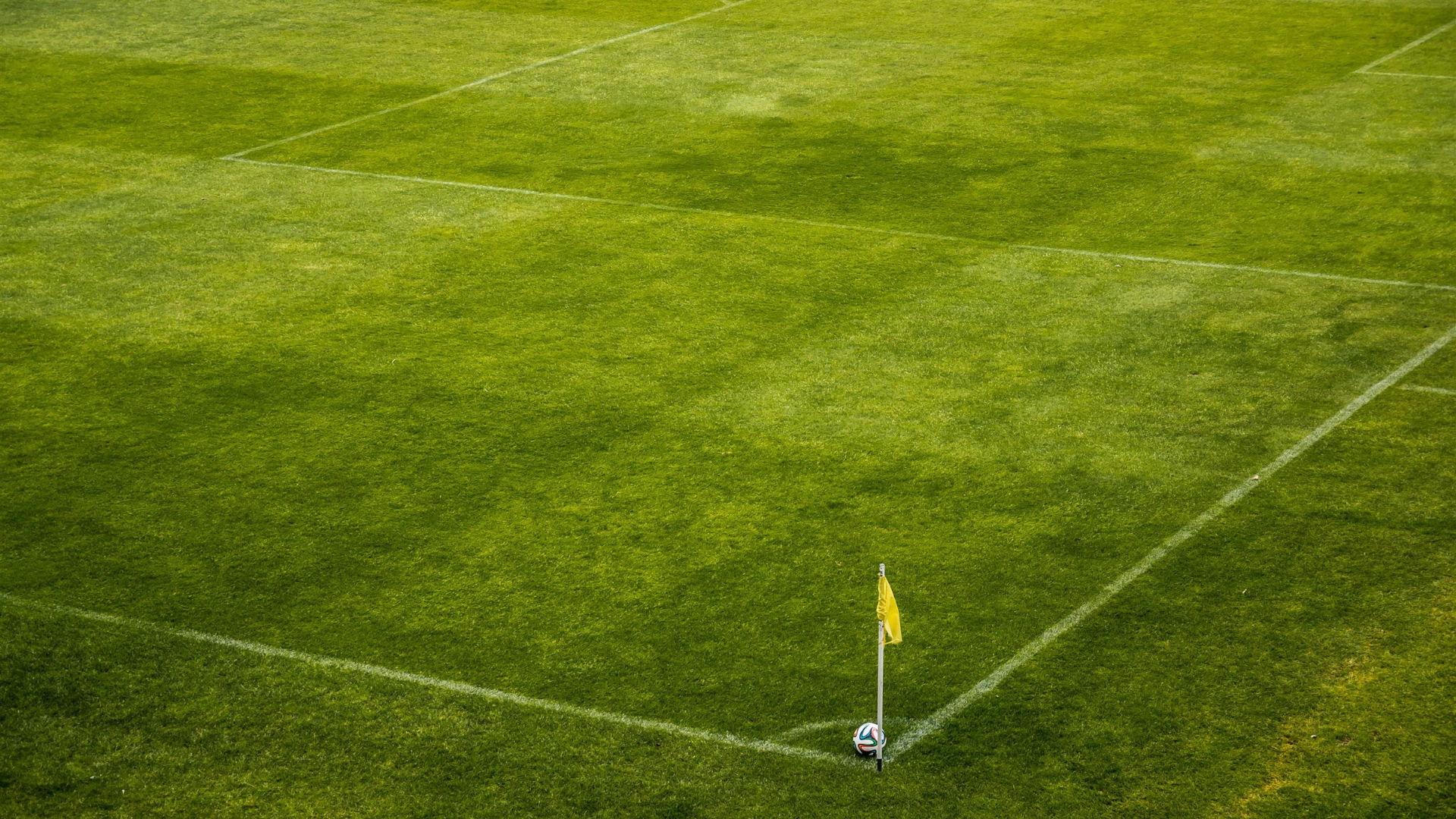
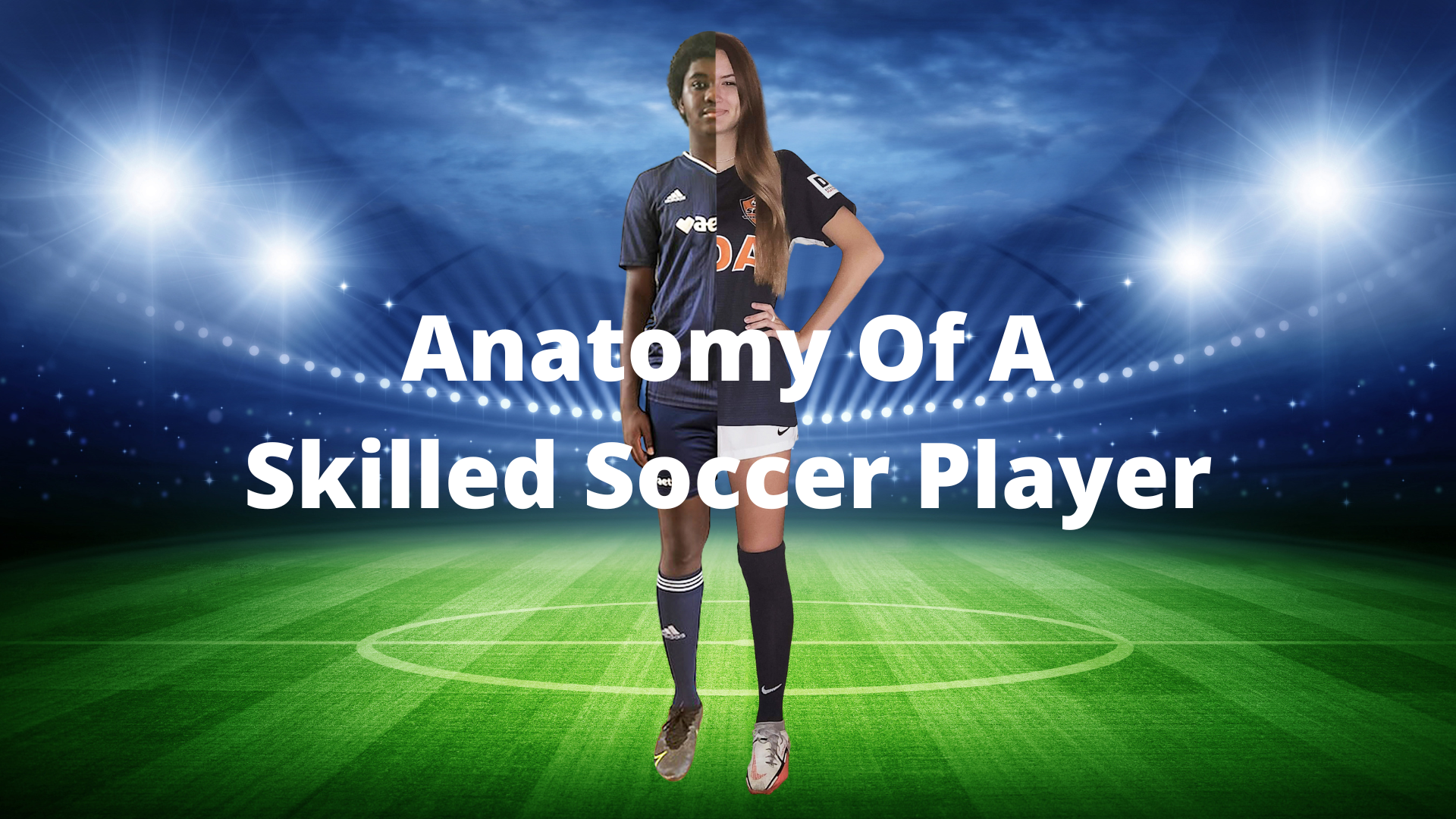
While most people think of anatomy as body parts, for purposes of this article, we’re going to expand the definition of anatomy to include body parts, intangible personality characteristics, and environmental factors. Let’s get to it.
Soccer IQ
The place where it all starts for soccer players is the brain. For any youth soccer player to be considered a skilled player, they must have a high Soccer IQ.

Soccer IQ at it's most basic level is a player's ability to make good decisions in a soccer match.
Soccer is a decision making game. At all times, every soccer player on the pitch is making a decision, whether they are on the ball or off the ball
What is a good soccer decision?
A good soccer decision is performing the action that is required by the situation in the moment. During a match, a soccer player will make hundreds, if not thousands of decisions, and no two decisions are exactly alike. The quality of those decisions determine the outcome of the match.
So how does a player increase Soccer IQ?
Coaches can certainly play a big role in this. Age appropriate drills and games can help develop high soccer iq. 1v1, dribbling, passing and receiving, etc at younger ages. Rondos, keep away, and tactical training at older ages. However, what separates the skilled youth soccer player from the average player is what they do away from "the club training ground"
A few things players can do on their own is:
1. They should watch high level soccer. This teaches them what world class players do on and off the ball. It shows them the little things they should do to be able to “read the game”
2. They should learn how to take care of their bodies, which means good nutrition and proper amounts of sleep. Both factors are crucial to cognitive development in young players.
3. Review game film. If possible, watch their game footage and take note of what they can improve on in the future.
4. Keep a ball at their feet as much as possible. The more comfortable the player is with the ball, the better he/she can play with their eyes up, scanning the field, anticipating opponents’ moves, and reading the game.
Here are a few resources for things your player can do to improve soccer IQ.
Quick tips to increase your soccer iq
Learning the difference from soccer iq and naturally understanding game situations
Video Example of a High Soccer IQ Play
In the clip below, the back side forward on defense (in Black) scans the field, anticipates the pass, intercepts the pass, dribbles deep into the defense drawing defenders, then passes to the winger with his "weak foot" who scores the goal. (it was called off, the winger was called for offside, but it doesn't diminish the quality of decision making.)
Heart
What is meant by heart in the context of a skilled youth soccer player? Heart is desire and determination. Heart is giving 100% regardless of circumstances in the game. Heart is training on off days when you don't feel like it. Heart is the desire to get a little better each and every day.
It can't be taught. It is an innate quality. The main thing a parent can do is to encourage and nurture that fighting spirit in their player.
Environment Around The Player
This is where the parent can help the most with development of a skilled youth soccer player. The best thing that a parent can do for the soccer development of their child is to place them in the appropriate soccer environment.
The Coach
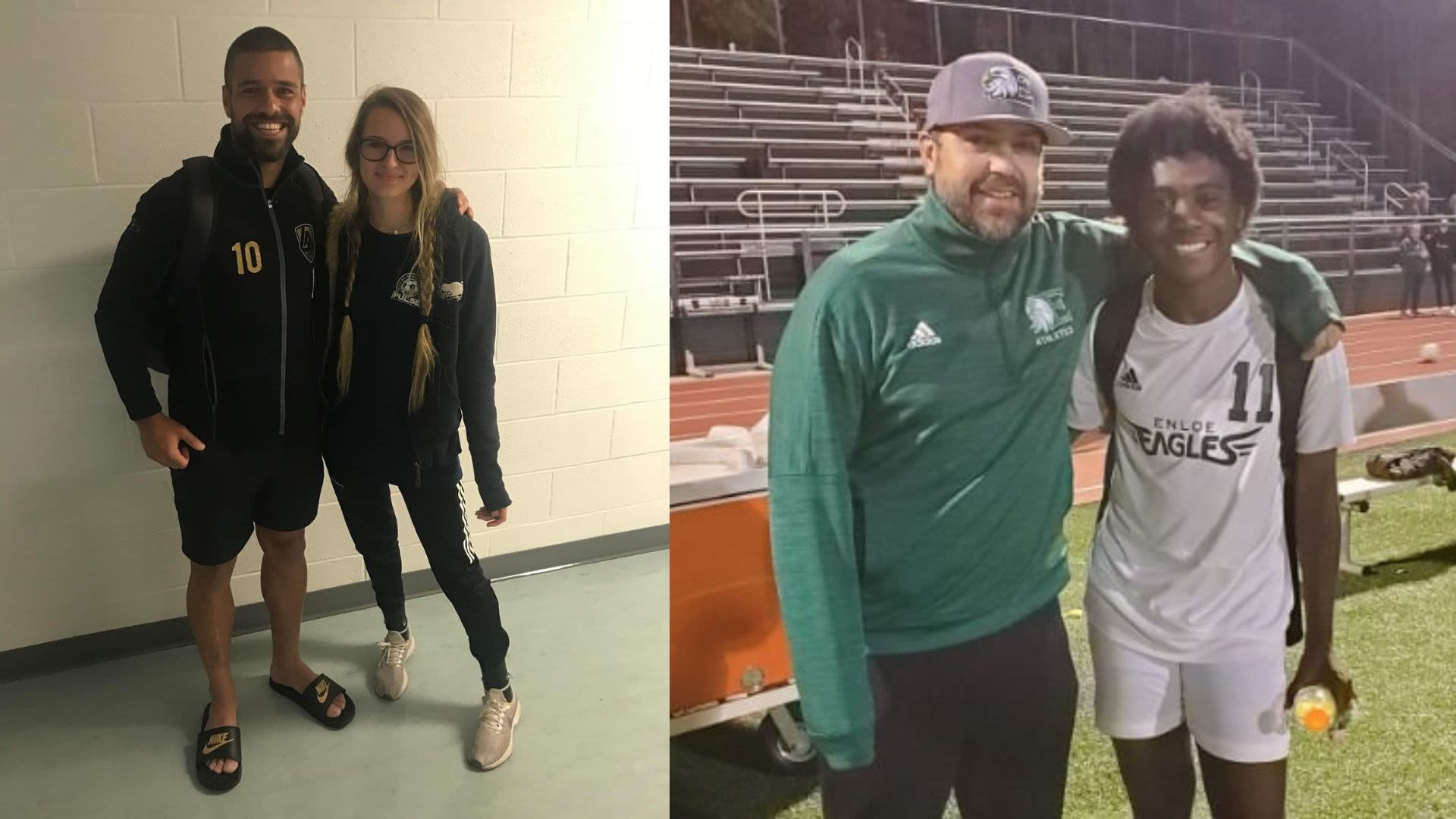
A great coach can be a difference maker in a player's development, on and off the pitch. As parents, we don't always have control over who the coach will be. However, we can establish clear lines of communication with them, and encourage our players to do the same. When that coach-player bond clicks and grows, the player's development generally increases substantially.
Family Support
The one thing that parents can absolutely control in the soccer development of their player is themselves. We're not talking about paying for everything, or ubering them back and forth to practice, although that is a part of it.
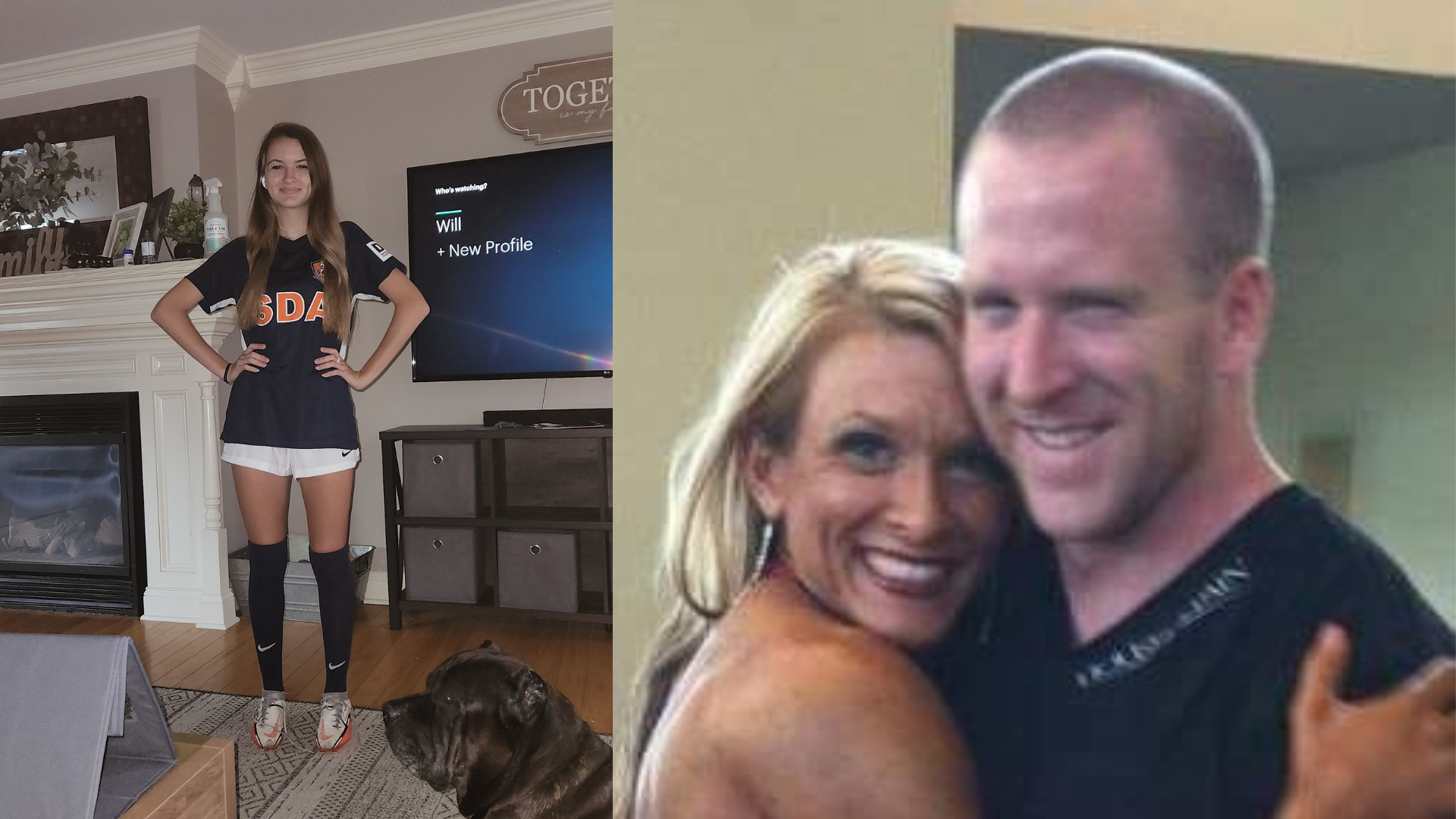
We're talking about simply being there for your kids. Cheering them on at games. Being there to give them a hug after a hard fought, heartbreaking loss. Making sure they take care of business in the classroom. And yes, even brag on them to your friends. To put it simply, just show up.
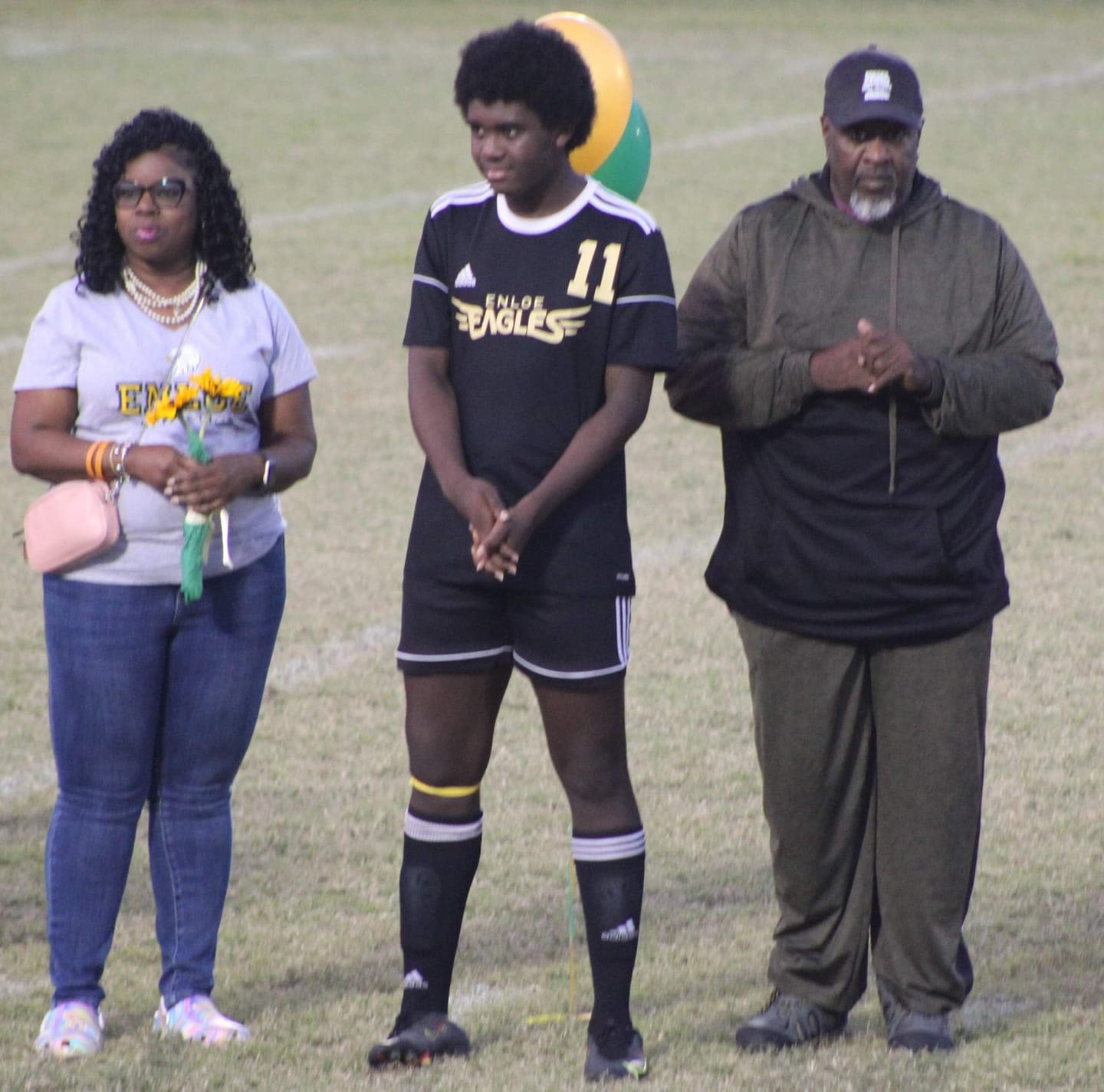
In conclusion, there are 3 main ingredients that every skilled youth soccer player possesses. It starts with a high soccer iq. Throw in a generous helping of heart. Finally, add a heaping portion of family support and proper soccer environment. Let it bake a few years, and the end result is a skilled youth soccer player, and more than likely, a decent human being.



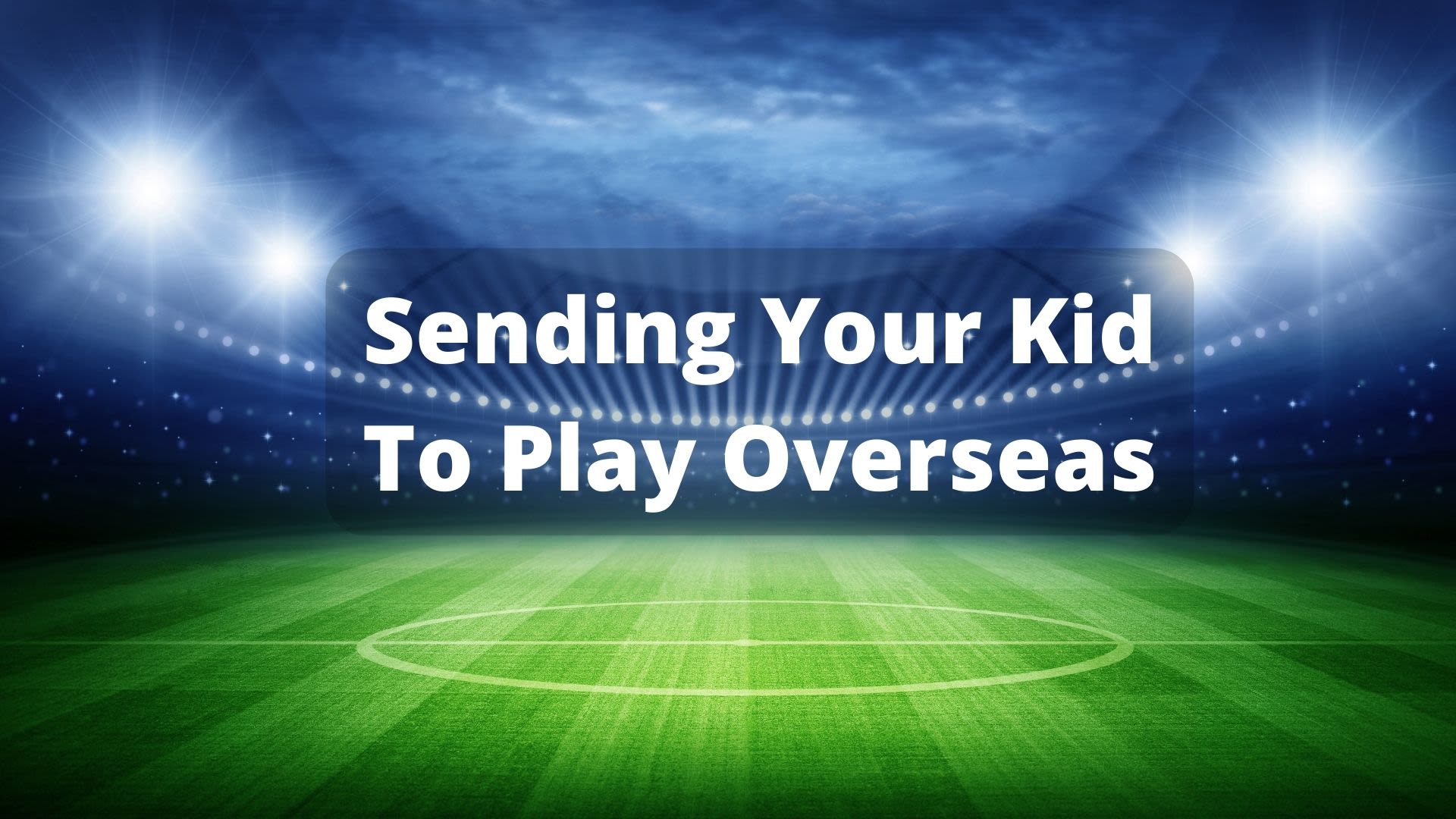
A Conversation With
Teesta Sullivan
Soccer Parent Lifestyle: Today we're going to talk about a very special experience. Teesta's son had the opportunity to go and train overseas. We're going to talk about how that happened, and if you are interested in your kid playing overseas, some of the things that you need to do. Teesta, I understand he started overseas at age 15. How did that come about?
Teesta: He did, we had been at the Wilmington Hammerheads in Wilmington, North Carolina, and our Director of Coaching was a gentleman named Antonio Saviano. Turned out that his best friend was an Italian Football Federation (F.I.G.C.) Coach. He was also a scout for the F.I.G.C. He had an Italian soccer school that he had started. Bruno would take three, to maybe six players every year, and he would personally work with them three to four times a week. In addition to that, he would place them in local clubs, to suit whatever level they played at.
Most of his players were in high school. His program works with a local boarding school in Assisi, Italy. The boys lived at the boarding school and attended classes there. During the afternoon, they had their soccer training.
There are many restrictions on American players playing abroad. FIFA has a number of regulations in place. These are called Protection of Minor Players. They oversee who's allowed to go to Europe as a minor student, or minor player, and train in one of the European countries.
There are six exceptions to the rule, which restricts minors from just going abroad to train. One of those exceptions is being a student. Most of the pay to play academies that are abroad, are based on a player going as a student, and enrolling into a school. Oftentimes, it's just a language school. Now, many of the programs have actual high school, or college level classes incorporated into them as well.
As I said, the program Jared attended had the players living in a boarding school. It was an old convent, known locally as the Convitto. The building was a few hundred years old. It’s massive, all stone and marble, beautiful to look at, but no AC, just fans and registers for heat.
Jared was 15 at the time. He was placed with a division F program. It was a men's league. He was playing with 21 to 26 year old players. It was phenomenal training for him. They actually had a little stadium, and people in the community would go and support the local soccer team. My son loved that.
Now, that was a challenge also for him at the particular program we went to, because the classes were held in Italian. He was taking a full load of classes. He did take both an English class and an English composition course, so at least those two classes were easy for him. The school had tutors in place to help the boys who did not speak Italian as a first, or second language to help them.
His teachers were very good. They were helpful. They allowed him to take his exams, to write his exams in English, even though he had to take the classes themselves in Italian. It was definitely a very immersive experience for him, but it forced him to learn the language.
They had a cafeteria, 3 hot meals a day and 2 snacks. Classes in the mornings, practice in the afternoon and evening. There were three young men in the program when my son attended, and they would train with him three to four times a week. He had two other coaches who worked with him. It was almost one on one training. Then, he had the boys place in local clubs.
Soccer Parent Lifestyle: Now I understand after that, he came back to the States for a little while, and then went back to Europe.
Teesta: He did, We have two other children, and all three of them were going to be in high school. My daughter was a freshman. Jared was in 11th grade, and my eldest was a senior. We wanted at least that one year of normalcy, if you will. He attended school here, and then he went back to Spain this time for another pay to play academy. He spent almost a year with them before COVID hit. All the boys were sent home. The next year, they started the program up again.
This was an interesting club. It's quite large, it's well known there, because they actually have two mens teams. In many of these countries, if you have the funds, you can either purchase a team, or start a club. You start at the lowest levels, and work your way up. This club now has a preferente and a tercera level team.
I think they were at the preferente level when Jared went. It's a different design as well to have an academy that's associated with the club. They try and make it a little bit more in line with the actual academies in Europe.
Again, this was a pay to play academy. Jared is a US citizen, so as a minor he was only able to play as a student. For the most part, I think the majority of Jared's teammates were American, followed by Australian. There were kids from all over the world there, Indian, Canadian, Mexican... That's another interesting aspect of some of these clubs. You’re put together with players from all over the world and really get an opportunity to learn about the world around you.
They have started a women's program that is really doing well. It is comprised mainly of US players.
This Spanish program had a restaurant where the players ate. The boys were housed in local hotels. The girls were housed in a separate compound.
The schooling was also different here. You had the option to take classes at their facility. Alternatively, you could opt to do an online program of your choosing. We elected for Jared to complete his coursework for graduation online. He did have to participate in the language classes – this is what allowed him to be training in Spain.
Soccer Parent Lifestyle: Talk to me about what it was like to send your kid overseas. Obviously he has to be mature, and maybe a little different than your average kid. Talk to me about that aspect of it.
Teesta: It was very difficult. Especially the first time, when we sent him to Italy, it was very hard knowing he was going to be so far away. One thing that made it a little bit easier, was that the gentleman who ran the program was somebody who we felt, we knew. We had spoken with him several times. Our D.O.C., who we'd known for several years, was very close friends with him. We had a certain level of trust based on that.
I went with Jared, and spent about two weeks with him when he initially started, which made me feel a little bit more comfortable as well. I was able to see the location, walk around with him, help him get settled.
That was definitely helpful to me, and to my husband, I think, but it is very difficult. You feel like you're missing out on milestones, you're missing out on major events. If you have other children, you feel like you’re all losing family time.
In Italy, it's six hours ahead of here. Jared would wake up long before we were awake, and he began, I don't know how it started, but he would send us a picture of his breakfast plate and a note. We've kept this up, even now every morning, I get a photograph from Jared. Oftentimes, it's food, sometimes it’s a cool car for Dad, occasionally it's him.
We grew in the habit of exchanging text messages throughout the day and then would usually have a quick whatsapp call every afternoon before he went to bed. He also kept in touch with his siblings through facetime, so fortunately with today’s technology, we were able to know what was going on with each other, but you still miss the actual contact. You’re not actually seeing them every day.
We knew that he was loving the training, and that helped. Even though he was occasionally homesick, he was making friends, and having an incredible life experience.
Life in Europe, and soccer in Europe, is completely different than here in the US. In the evening, they had free time, and the three boys would often go down to the Plaza that was maybe a quarter mile away from the Convito. They would walk down these cobblestone streets, go to the Plaza area and just start playing with the ball.
You’d have older men, ladies, kids, whoever, just jump in. Either walking by, they pass the ball a few times, or jump into an actual picnic. My kid, like many of the kids on your site probably, always has a ball of his feet. He’s always ready to play. He can't walk without kicking something.
That's one thing that he has pointed out so many times was different, from when he was in Italy, and Spain, to when he's been here in the U.S. In the U.S. you have to have organized play. It's very difficult to just get a group of kids to go to the backyard, and play, when you may not have them all in the neighborhood, or you have to plan it. The parents have to be involved in taking them when they're older, they still have to organize a time, find a field that's open. There's a lot more to it. When you're abroad, I don't think people think about it. They just go, you're on the street or wherever, and people are just, strangers will just start playing with a ball. It's this universal language.
Or it's just a very different mentality. I had thought that was interesting too, because even in the two weeks that I was with him, as we would walk around, he would always have his ball. We had one gentleman in a taxi cab pull over in the cab, which startled me. This cab driver jumped out. He was just talking with his hands, and speaking in Italian, and I didn't have any idea what he was saying. Jared had taken a few classes, didn't speak that well at that time.
The guy just pointed for the ball, so Jared passed it to him. The man passed it back and basically they played in the street for two, three minutes, and then he hopped back in this cab and drove off. It was very bizarre, but it was a wonderful experience, just that love for the game. You don't get that same sense here.
Soccer Parent Lifestyle: And now your son has had these great experiences. I understand that you and your husband have turned this into a business where you're creating opportunities for other kids to go overseas. Talk to me a little bit about that.
Teesta: Well, it was interesting after Jared went. I initially started a blog just for my family. My parents, my mother-in-law, aunts, cousins. Every time he would send pictures over, we would put those up in a blog. I was trying to journal some of his experiences. We thought as he got older, he would enjoy looking back, and having this.
I started having parents reach out to me, asking how we had found the program, how he was liking it, where they could find similar programs. Then, I began having parents who I didn't even know reach out to me, because someone else they knew had heard that my kid had gone overseas for this training program.
I recognized that there were a lot of parents who want this information. For us, finding that initial program was not that difficult, because again, the D.O.C. at our club had pointed it out to us.
When we were looking for a second program for him, and we just wanted him exposed to something a little different, and we wanted him to be in a program that actually had enough players to form a team. That was the only negative I saw about the program in Italy. It was wonderful on so many levels, but the boys had to be placed in separate teams, according to their level. I wanted to find a program that was large enough to sustain its own team.
As we researching, we realized that there are dozens, and dozens of pay for play academies out there. Some place players in homes of loca families. Others use hotels, or have their own facilities.
We recognized that it's very difficult to find information and we knew that we weren’t the only parents looking. I started Go Soccer Pro as a way to capture all this information in one place. I wanted it to be a one stop shop where parents and players can learn about opportunities for training abroad in different countries. I have separate pages for Academies in Europe or camps/tours in Europe. I have a ton of blog posts on all sorts of related topics – leagues in France, how to get a visa, can you use educational funds to pay for training?...
I add Academies and Camps as I learn of them. I'm not recommending, or promoting. I tell many of these academies who reach out to me, asking for me to promote them, that unless I vetted them, or have actually seen their facilities and spoken to their players and coaches, I can’t recommend them. I can share their contact information though, so parents can reach out and find a place that is a good fit for their family.
I try and be very clear to parents, if they call me, or write to me that didn't know that this is the contact information, this is what we know about it, what their website is, but you'll need to go and find out on your own.
They're more, and more countries now doing this. We were recently contacted by a group out of Poland. They cater primarily to US and East Indian players. They place them There's a Polish gentleman who used to play, who is partnered with a young man who's from India. The players are placed in local clubs and work their way up. This group has also recently purchased a club. So they're playing European soccer, or European football in Poland, and then hopefully being fed out to other countries.
I do think that's an interesting way to do it as well. Jared happened to attend a program in Italy, and then in Spain. Looking back, I think the Italian program was excellent. I have no regrets about sending him there whatsoever. The biggest benefit to his having attended the Spanish program, was that it allowed him an opportunity to trial for a couple Spanish clubs because he was in the country. That being said, I think it's very difficult to break into English football, or Spanish, or Italian, or German, unless you are the next Messi, your chances are very unlikely that you're going to come from the U.S. and go to one of the top tiers.
What people don't realize, is that if you go to Slovenia, or Serbia, or Austria, one of the smaller countries, you can still be playing top level football, and you're being seen by the same Scouts, the same agents. You're playing against the same teams at the top levels. You're getting a chance to actually compete, and possibly make your mark, or break into football. I think for the serious player, the better way of making it in European football would be to go and try out for some of the teams in the smaller countries, and then try and work your way up.
Soccer Parent Lifestyle: Teesta, you've given us a lot of great information, and I certainly appreciate your time, and coming on, and talking with us. Hopefully, everybody go to Go Soccer Pro if you're interested in sending your kid overseas.
Podcasts We Like
There are some great podcasts out there that deliver outstanding information about youth soccer and youth sports in general. These are a few we like.
Alpha Girl Confidence
In this episode you'll learn 4 powerful ways that you can better support your daughter with her mental and emotional health. Whether your daughter is feeling great or going through a tough time, this episode will help the whole family to be happier and healthier in all areas of life!
Anytime Soccer Podcast
In this episode, Neil Crawford, founder of Anytime Soccer Training offers a list of key issues facing youth soccer in America. Buckle up and get ready. Join the conversation via the Anytime Soccer Training Facebook group. https://www.facebook.com/groups/anytimesoccerparents This show is sponsored by Anytime Soccer Training. Anytime Soccer Training removes the guesswork from in-home soccer training by combining over 101 fun skill-based soccer games with over 1,000 step-by-step training videos - all fun & all 100% follow-along.
The Soccer Specialist Podcast
The Soccer Specialist Podcast is for players, parents, and even coaches that love soccer and want to discover ideas, tips and strategies focused on individual player development. Things like: building confidence, becoming mentally tough, improving 1v1 play, finishing, ball striking, how to get faster, and lots lots more. We'll talk about how coaches and parents can better support players, and strategies, tips and training ideas players can use to reach their potential in the best game in the world.
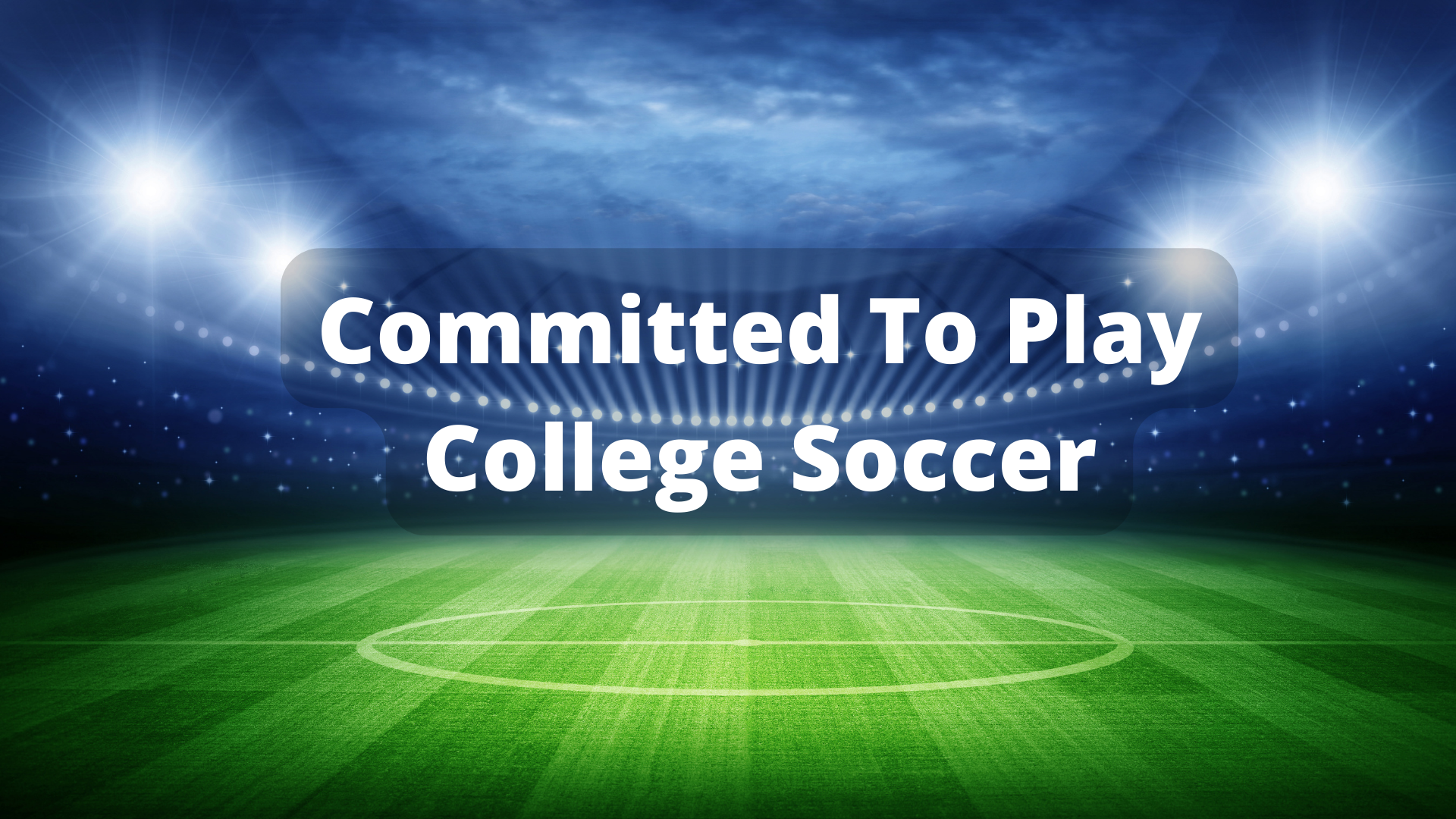
Committed To Play
College Soccer
A conversation with Skye Denton, an impressive young lady who has committed to a college to play soccer, and plays semi-Pro soccer in the WPSL, all before her Senior year in High School.
The Soccer Parent Lifestyle: 1st off, why don't you tell us what college you committed to?
Skye: I have committed to College Of Mount St. Vincent in the Bronx, New York. It's a D-III college.
The Soccer Parent Lifestyle: What drew you to that school in particular? What was it about that school that made you want to commit there?
Skye: Actually the funny part was the coach contacted me. I actually blew him off the first time, because at the time I wanted to go to Penn State, but then I went to an ID camp at Penn State and it didn't feel right.
So I went back and contacted the coach at college Mount St. Vincent, and he invited me to tour the campus. So I went and toured the campus and I loved everything about it. I loved him, I loved the campus, the environment, and then I ended up committing right there.
The Soccer Parent Lifestyle: One of the reasons I really wanted to talk with you is because you have a unique experience. This summer you're actually playing for a WPSL team. And first of all, what team is that? And how did you get the opportunity to play for them?
Skye: I play for FC Omega, they're a small team based out of Maryland. I kind of got into it based on the coach. He went to a showcase I was in and contacted me via my sports athlete page on Instagram, and he said that he was interested and asked if I had any more videos to show him.
I sent him some full game footage, and I didn't get a response for two to three weeks. And so my thought was maybe he doesn't think I'm ready for this, or maybe he thinks I'm too young. However, a week later he did text me back and he was expressing interest.
He said that he was willing to work around the fact that I couldn't attend practices because it's a six hour drive there and they practice two to three days a week and high school was still in session. Since I do play games with them, he just sends me things I need to work on based on video analysis, like Instagram murals or things that he thinks I personally need to work on since I don't go to practices and I just show up to games.
The Soccer Parent Lifestyle: How is it in the WPSL as far as level play versus your club play?
Skye: It is very different. It's a lot more intense and the speed levels are very different. So going into it, I didn't expect much of a difference. Then in our first game, we lost 14 to zero. So it was a real eye opener. They were moving around us. I couldn't keep up. It was a real shock. I didn't know what to expect going into it, but that was definitely not it.
However, I think we've progressed significantly as a team. The first game. We didn't know each other. We didn't know how each other played. We didn't know names, positions. We didn't have any chemistry, but now that they've practiced together, we've played games together, we're getting more familiar with each other.
We're starting to think alike. Like if you make a run and you pass it, they'll automatically pass it back to you instead of selfishly taking it for themselves. I think we've just progressed overall as a team and I think if we keep it up, we can get better.
The Soccer Parent Lifestyle: How has playing at this higher level helped you with your club ball?
Skye: I think being able to now keep up with the higher level players, I think it's increased my confidence and skill tremendously. I used to be very timid with skills because I know so many, it's like when I do 1v1s, I don't know which skill to pick. And now playing with a higher level team has increased my skills and it's increased my soccer IQ. And now I don't have to think, I just do. It's like secondhand nature now because you get so used to the speed of play that pros use, that going back to regular or select soccer it's like, "Oh, this is like walking."
The Soccer Parent Lifestyle: You've obviously got one more year of club, but then on into college. Do you think that will help you in your college career?
Skye: I think going into college, it's going to be a lot different than select, but I think that if you just go out there and you play like you know how to, and you're just relaxed and confident and you don't rush, I think it won't be that much of a difference. I mean, skill level? Yes. And speed of play? Yes. But I think overall there's not very much of a difference because as long as you can get along with teammates, you should be fine.
The Soccer Parent Lifestyle: What position do you play now for club?
Skye: I play the 7 and 11, outside midfielder, and sometimes I play center and sometimes I play forward. It just really depends on where my coach puts me.
The Soccer Parent Lifestyle: So versatility is a good trait to have. Has your college coach talked to you about where you'll play there or are you not really worried about that?
Skye: When I went to tour the college, he had already put my name on the board as the position that he wanted me to play, which was a 7. Left back in case people don't know numbers.
The Soccer Parent Lifestyle: Do you have a preference for where you play or are you just willing to play whenever?
Skye: As long as I get playing time, I don't really care where I'm put as long as it's not goalie because we want to win.
So yeah. I won't protest, I'll go out there and try my best wherever he puts me. I can't promise that I'll be great at a position that I don't know how to play. But as I get the hang of it, I'll progress in that position. But I personally prefer outside midfielder because I'm small and I can sneak by players without being noticed, because normally I'm forgotten on the outside. So when my player does pass me the ball, no one is near me, so I can just run up the side.
The Soccer Parent Lifestyle: Finally, what one piece of advice would you give to freshmen and sophomores coming up behind you in high school? As far as looking at colleges and trying to get recruited to play?
Skye: Don't put all your eggs in one basket.Make sure you have backup. You need to have plan B, plan C, the whole alphabet. You need to have more than one college. And you also need to have more than one career, like major that you have in mind, because if you go into a career and you don't like it, or you don't like the classes, or it's too hard, you can always change your career but that also may make it harder for sports that you're doing.
And also just have fun. Soccer's supposed to be fun. If you're not enjoying it, then you don't want to do it for four or five more years. You don't want to be trapped in a scholarship that you can't get out of. So make sure that you enjoy it before you commit.
The Soccer Parent Lifestyle: Great advice. Good luck to you for the rest of this WPSL season and good luck next year in club and we'll keep following you on to college.
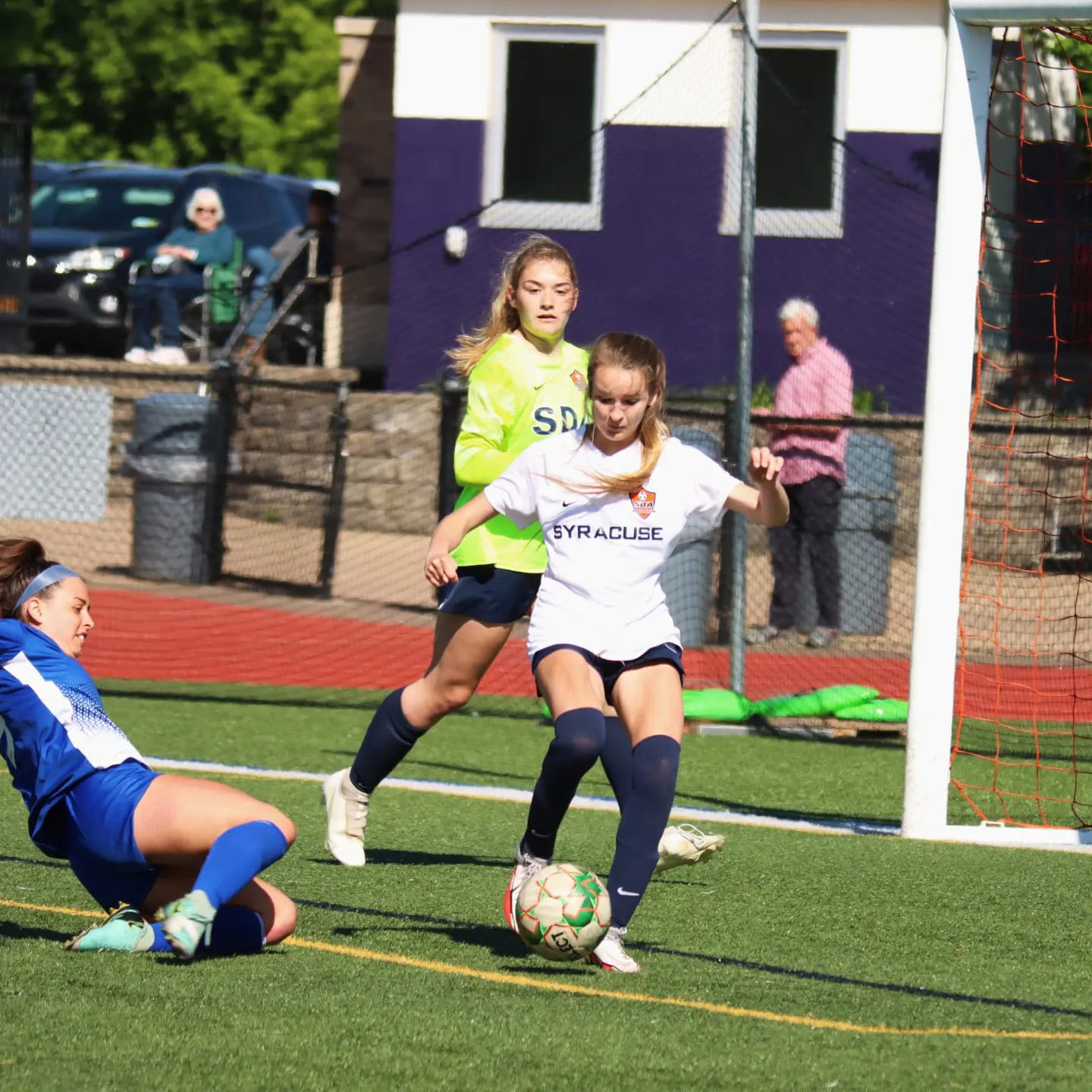
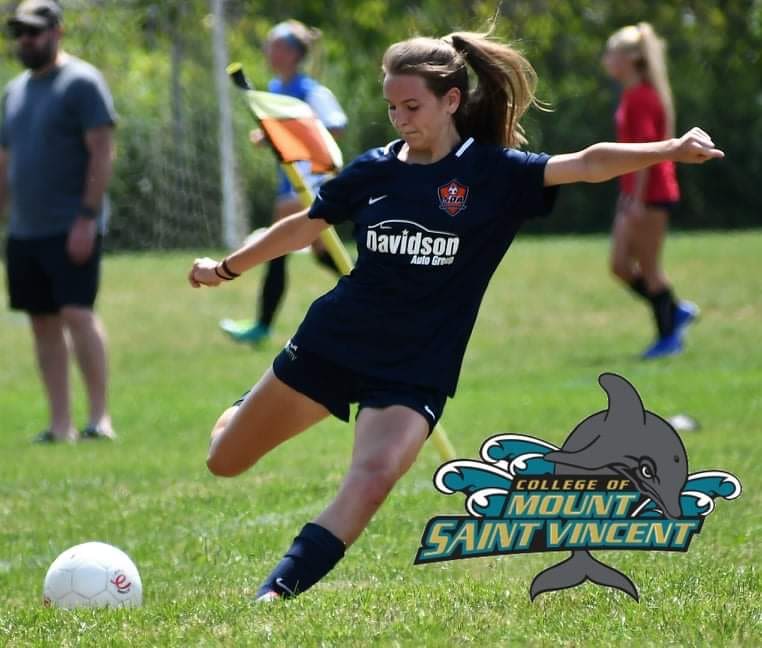

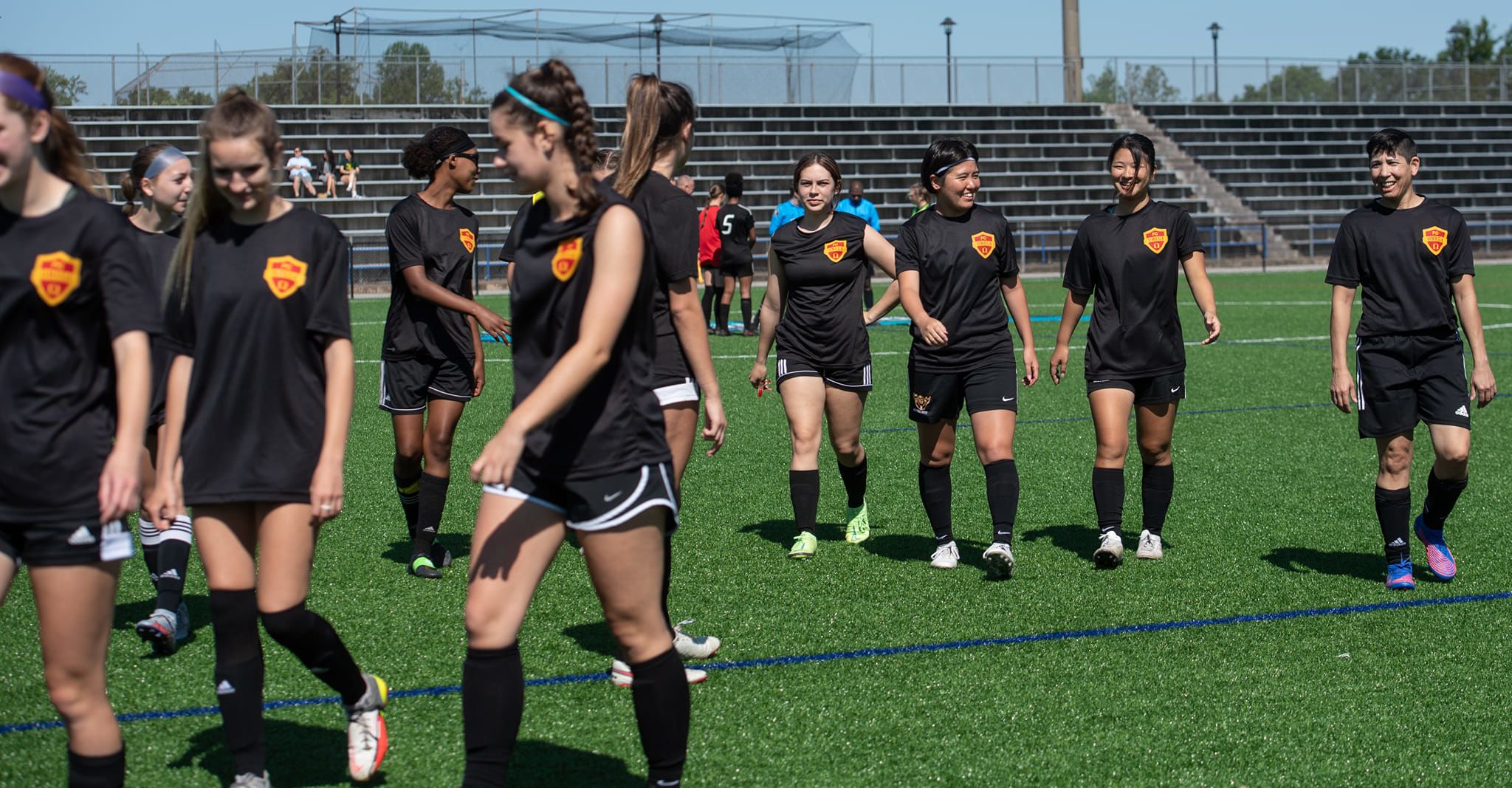
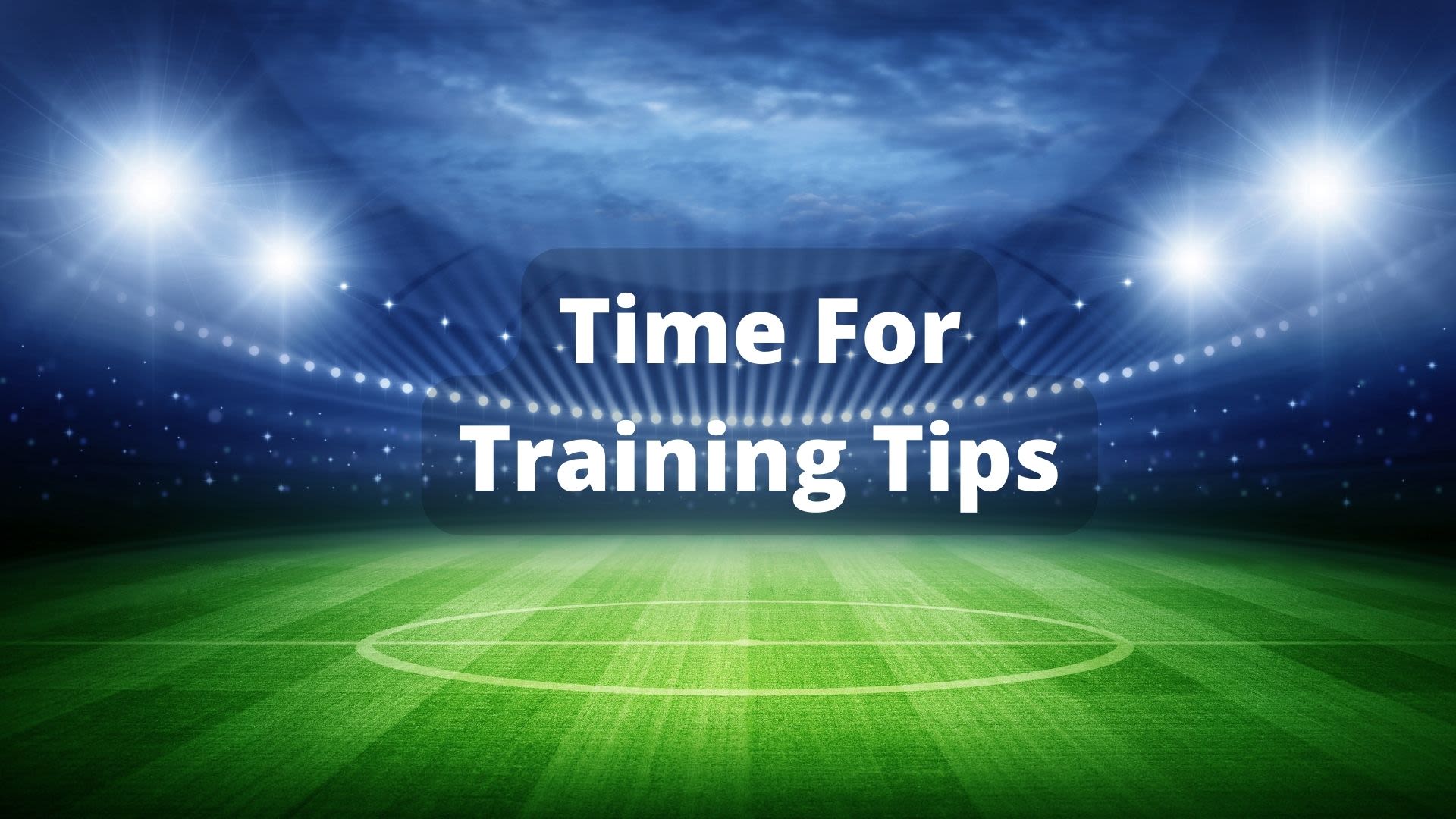
This month's training tip comes courtesy Laura Stark from Stark Strong Performance.
Exercises To Help Goalkeepers Get Off The Ground Quickly
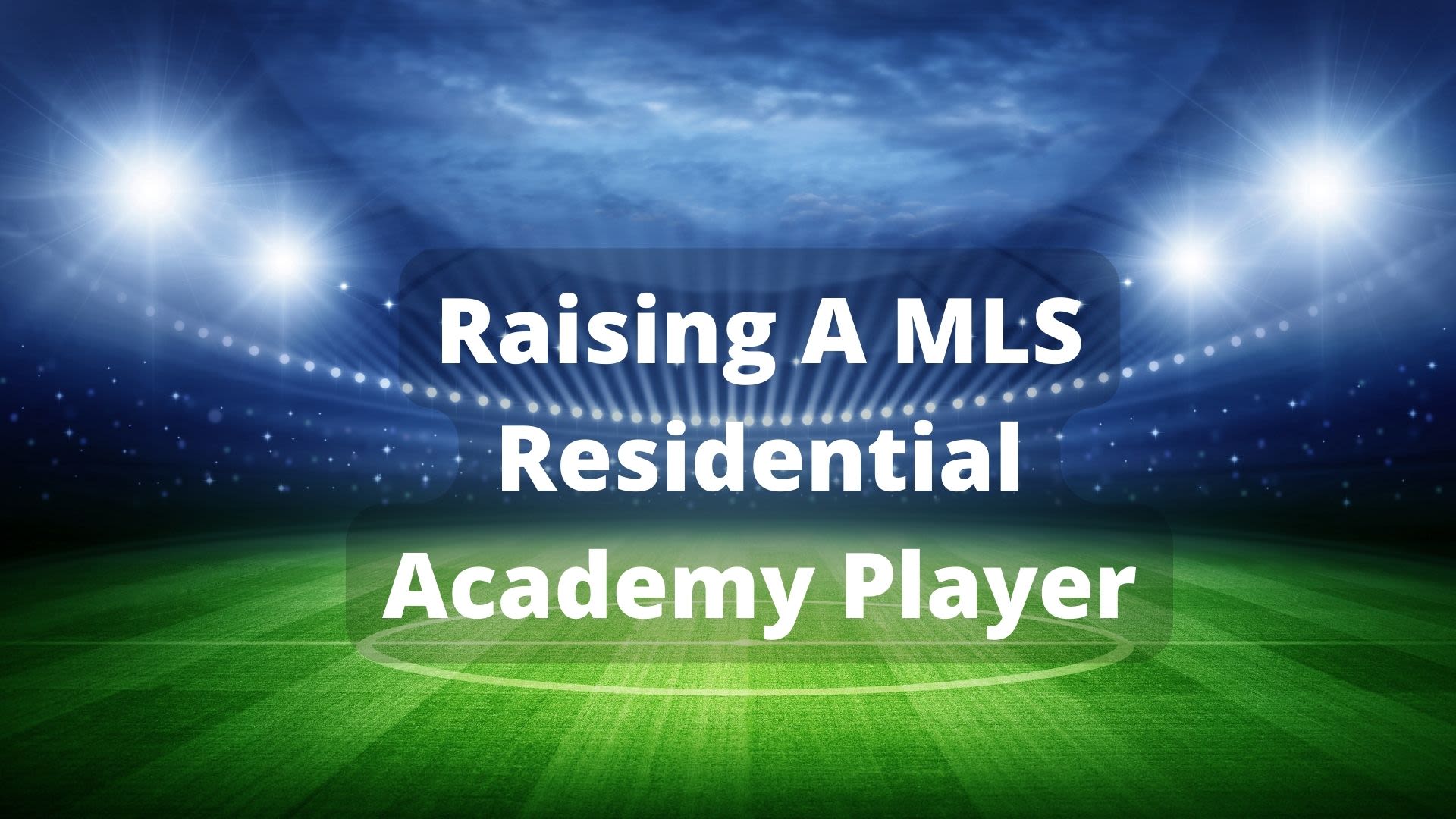
A Conversation With
Tracey Brame
The Soccer Parent Lifestyle: Tracey, first of all, I know you guys live in Michigan. How did you get connected with FC Austin? Because that's in Texas, that's a long way from home.
Tracey: It is a long way from home. And we got connected to Austin FC kind of in a roundabout way. Kamau was playing in Michigan for the Michigan Wolves, with the great local academy in Livonia, Michigan. And Austin FC is a brand new academy. I think they just finished their second full year as a youth academy. So there was a coach at Austin FC that happened to know a coach at Wolves. And during the COVID year, year and a half, they were having difficulty getting out to scout players and things like that in person. So they were watching a lot of film, connecting with a lot of resources. So they reached out to the Wolves and saw some film of Kamau playing, and invited us down to a combine.
And my first reaction was, "You know what? I'm ready to get out of the house," because we were kind of cabin feverish with COVID, "but there's no way I'm sending him to Texas, so we'll go... I've never been to Austin before. Let's go check it out, but no way he's going 1,000 miles away." So he went to a combine, and then was invited to try out with the team.
Yeah, so we went out to Austin to check it out. Then he was invited to come try out with the team. And it happened that they really liked him. I'm actually, to be honest, surprised that my husband went for it. My son's been dreaming of being a soccer player since he was a little kid. We had a lot of family conversations about whether he wants to venture that far from home. We're a relatively close-knit family. We're one of those families with all four of us at most soccer games, so it was a big change for us. But Austin FC had a nice setup. They have the team and they're connected to a school called St. Stephen's Episcopal. So they have a partnership with the local boarding school, that's a really, really good school. So the combination of the school and the soccer opportunity, we said we'd try it for a year. And he has loved it. It was quite a transition for us, adaptation for us, but he loves it.
The Soccer Parent Lifestyle: You mentioned they have a partnership with the school. In your opinion, how does the academy approach academics for the players? Do they stress academics?
Tracey: So that's a great question. And my understanding is, of course, my experience is with Austin FC. Our local club in Michigan was affiliated with Columbus Crew, but it varies by club. Different clubs have different academic setups. So for Austin FC, they have recently partnered with an online education program that works with The University of Texas and this private company. And so a lot of the kids are moving toward a paradigm where they are combining training in school during the day through this online program, a combination of online schooling and tutors. This is the first year that they're really doing it in earnest. So that the kids, because they have training in the morning. We have training in the morning, but it's optional. We opt to stay at our school. They also have a partnership with the boarding school, so that you can have a more traditional school experience, and all the social aspects that come with that.
Yeah, you have to be admitted to the school and pay for school and all that, but it's a great school. So they have a combination of options. Some academies really have all the kids doing online schooling. Like Real Salt Lake, all the kids go to the same school. I think Philadelphia Union is the same way. So there's a variety of situations. We picked the boarding school in part because we wanted that educational experience, but also because the other option was for Kamau to stay with a host family. So they have a network of host families when they bring in kids from out of state, so you can set up with the host family and then either go to a local high school or do the online schooling. We opted for the boarding school, so that he lives on campus. The school helps get him back and forth to practice every day. And then the club takes responsibility for making sure he gets to games on the weekends.
The Soccer Parent Lifestyle: Now, not to be too personal, but a lot of people wonder, does the academy pay for this, or do you guys pay for it, or do you split the cost?
Tracey: No questions off limits. So for the MLS academies, the whole soccer experience is paid for, which is pretty nice. So when we were with the local academy in Michigan, which was a really, really great program, but it's a pay to play. The parents paid for the experience, the coach is paid, the uniforms and all that kind of stuff. The MLS was really investing in these academies, so they're pouring money into these programs, hoping to staff their MLS team down the line. Hoping to really get a cache of homegrown players.... And even if they get a couple of breakout homegrown players, I think they consider it a worthy investment at the youth level.
So we don't pay any club fees, we don't pay for uniforms. They provide shoes, they provide cleats for the kids, their whole uniform kit, warmups, all of that. All travel, including they travel quite a bit by air and stay in hotels. They're going to Amsterdam next month. We're not paying anything for him to go to that. The way that we structured the experience that we ended up paying for the boarding school, but that's an investment that we decided to make. We didn't have to do that. There's local public schools there, and the online program has a tiered system, where there's a less and more expensive version of the experience.
But the academy itself is making the investment in the development of the kids, trying to find the next latest and greatest
The Soccer Parent Lifestyle: So Kamau plays on the U17 team, correct?
Tracey: He does, yes.
The Soccer Parent Lifestyle: So going into his junior year of high school, in your opinion, does the academy push him more towards going the pro route to the first team or give them the option to go to college?
Tracey: Yeah, so again, Austin FC is relatively new and I have been impressed with what I view as their approach to this. As I talked to other people whose kids had come through academies, some of the criticism or concerns that they had were they really are trying to find pro players. And when they decide that your kid is not going to be a first team player, the development kind of stagnates, or they don't pay as much attention, or whatever. And that's just anecdotal. But that has not been my experience at all with the academy, at all with Austin FC. MLS, in general, has their branding. They try to brand themselves as being supportive of all kinds of paths, right? Because they note that people get to the MLS through college, they get to MLS straight from high school, they come from overseas, they come from USL.
And so they really kind of promote that... Because as we know, dealing with young people, development is not a straight line. You know what I mean? And the 15 year old phenom is not necessarily going to be the 18 year old phenom, and the 14 year old bench player may come into his own at 17. So Austin FC, they have a person who's dedicated to the... I think his title is talent scout, but he's dedicated to helping kids through the college recruitment process. So that started for Kamau this summer, just a month ago actually, just about four weeks ago. He sends the kids messages, has workshops with them about how to talk to coaches, how to send the email, how to make their highlight film, how to vet colleges, et cetera.
Because it looks good for them if they're sending kids to the top soccer programs around the country, whether it's D1, D2, whatever it is. So I have found that they really try to develop each of the kids in that kid's lane. There are a couple of kids who work out with the first team, who hope to be... There's a 17 year old on the first team who's actually really, really good. He's the head coach's son, but he's a phenomenal player. And he starts with the first team pretty often lately, actually.
So we have kids at all kinds of stage of development. They seem to support that. My husband would say, "Yeah, they support it as long as they think that you're good enough to be a team, because they will cut you." But they even seem to do that in love. They seem to try to be honest with the kids about their development. And so they see a kid who they don't think it's going to get... So my son was U16 last year, they don't have a U16 team, so he was playing on the U17 team, and he was playing behind a couple of U17 midfielders. And as they were curating the team for this team, they were trying to be honest with the kids about where they thought they would fit in with this upcoming year's team. Would they get playing time? Would they get... You know what I mean? And they tried to tell them early enough to try to find other experiences, as opposed to just saying, "We cut you."
So it is a professional environment. They are looking for what they consider top talent at any time, but they seem to do so very intentionally and with care. So there are a couple kids who are maybe on the bubble, who they don't know will get significant playing time in the U17 team, but they made them part-time players, and partner with the local Lone Star club, which is another really good program in Texas. It's not MLS, but it's really good. So they try to support all paths.
The Soccer Parent Lifestyle: Other than missing your son, is there any downside that you can share with parents or anything that they need to be very careful of going through this experience?
Tracey: So I'd say, yeah, and it's intuitive for most parents, but one of the things my son's coach at Michigan told us, he said, "Your son's going to be... Some MLS club is going to want him to come and play. And as you're considering where to send him, just remember that his family has been his secret sauce. One of the reasons he's been so successful and so well adjusted, et cetera, he's a good student, et cetera, but that's in large part because of the family support." So he said, "Make sure that you're looking at who he is going to be around. What kind of... Is it just a make it or break it cutthroat club, where there's not a lot of age-appropriate developmental support or are there people..." So that was very important to us, and so I watched that very carefully as he started at Austin FC.
But the same coach who recruited us, the person who was sent to convince us to come takes me to lunch every time I go to Austin. He talks to me about Kamau, tries to look out for him specifically because he knows that his family's not there, et cetera. So that's one thing I would just say. Just make sure that you really vet the environment, and don't get too excited about what I call shiny things, right? Like, oh we get to go to MLS Academy. Not all the experiences are equal in general, even objectively, but then it has to be a good fit for you.
Then the other things are like to watch out just for the normal developmental things that I think are important to teenagers. So one of the reasons we decided against the online program is that we really wanted Kamau to go to school, to have friends outside of the soccer club, to be able to go to the spring formal, to be able to do those things. Hang out, go to Dave & Buster's on the weekend and things like that. So watching out to make sure at least... And everybody's different in that regard. Some kids, they know they want to be a pro player, that's all they ever want to do, but I want him to be a kid and so how can... So one of the things we're trying to do is figure out how to get his driver's license, for example, because he's not here enough to get enough hours to get his driver's license in Michigan. And we don't want him to do it in Texas because I'm still learning how to drive around Texas. I'm not going to send him to Texas with a car.
And so just little things like that. So his friends here, who are still here in Michigan, they're getting their driver's license, they're getting cars and we're still trying to figure that out for him because he's not... Right? He can't really do a summer job because he's not here long enough. You know what I mean? Those kinds of things. So just trying to make sure that he gets to be a teenager, because he doesn't get it back. And particularly if he pursues soccer in any meaningful way beyond it, your childhood gets kind of cut short.
The Soccer Parent Lifestyle: Overall, if you had to start it over again, and say Kamau was 13, would you recommend for other parents to send their kids, if they're good enough to play at that level, would you recommend the experience?
Tracey: So in general, yes, with a couple of caveats. If Kamau was here and I'll have him say hi before we get off the line, but if he was here, he'd say U15 is probably the sweet spot. Because one of things I look out for, if you go early, if you send your 13 year old 500 miles away to go to this youth academy, because they think they're the next best, again, we talked about how development's not a straight line. And even at their club, the coaches talk about how the kids that are there on the U13 team, how many of them are actually going to be on the U17 team.
And from our experience, if you have a good situation where you are, a good coach, good support, good development at 12, 13, 14 years old, I don't know that there's as much of a need to... But by U15... My son went to Austin FC at U16. He wishes he would've gone to U15. Of course, we didn't know about it then, because the U15, that's where they're really starting to put that U17 team together. So you're playing U15, you're getting that experience, you're learning the system. Then you're a U16 playing up on the 17s, so it gives you a couple years to really learn the system and learn their style of play before your ultimate 17 year. Do you know what I mean?
Because after that, they don't really have... Most of the academies do not have a U19. So after U17, they now have a U23 program, which is basically their MLS2 kind of semi pro... You know what I mean? And so not all of the U17 are going to make that team. So U17 for some of the kids is going to be their last year with the academy... So if you can start early enough to learn the system and find your way and find your spot in it, that's great. Find your place in it. But like I said, I don't know how much you're sacrificing U13 to make it happen. You don't get those years back for your kid.
But again, and it depends. I know just enough people that this seems normal, even though when I think about it, when I talk to other people about it, this sounds crazy. But I know just enough people. Some people move with their kid, so if you are in a position where you could move to Kansas City and you view it as a family adventure, then I think you have to figure out what are you going to get out of it, even if your kid never goes pro? We had to say, because even with the resources and the experience and the opportunity, the likelihood of my son going pro... You know what I'm saying? It's still... Right?
And if he does, great. But if he doesn't, is this experience still worth it? And we decided that the school he's going to is a great school, an opportunity to go play with the MLS club, an opportunity for us, because I like to travel so I'm in Austin all time. We have direct flights from Grand Rapids to Austin. It's an opportunity for us to do really cool things. And so even if, like Dante, he decides not to play in college, for example, I won't have considered this a waste of time. And so I think you just have to, as a family, say, "What are we in this for?" And be careful about sending your 13 year old away because you think he's going to be Messi, because the statistical likelihood is that he probably will not, and that's okay. Still go for it!
I tell my son, "We'll support your opportunity and your shot as much as it's reasonable." You know what I mean? And so we're just on the edges of reason here.
The Soccer Parent Lifestyle: I certainly appreciate you having this conversation. You gave some very valuable information and I wish you guys well.
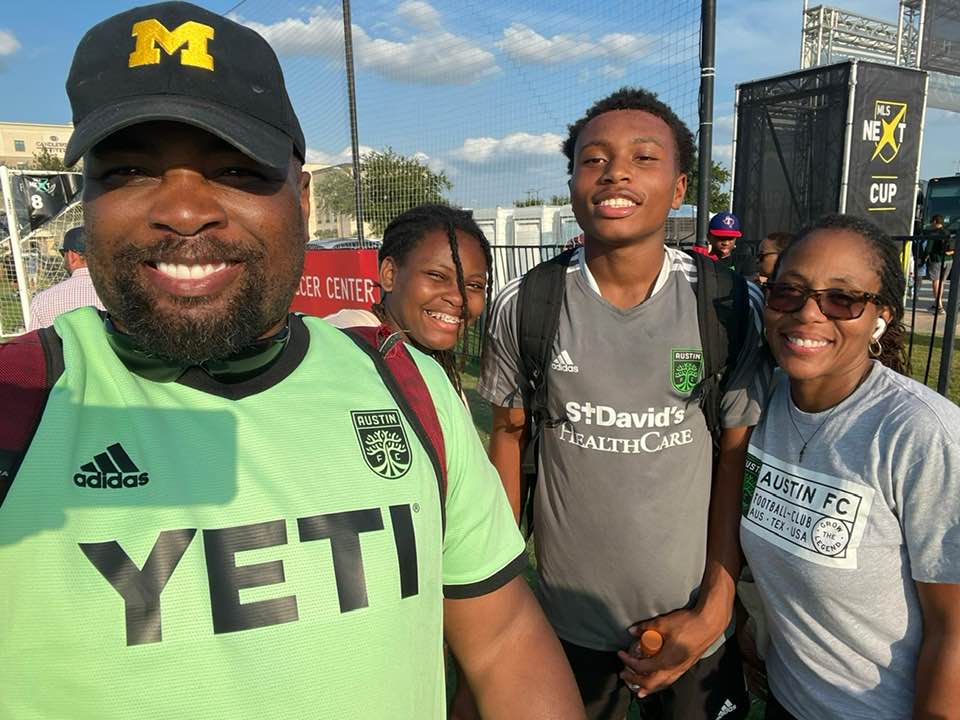
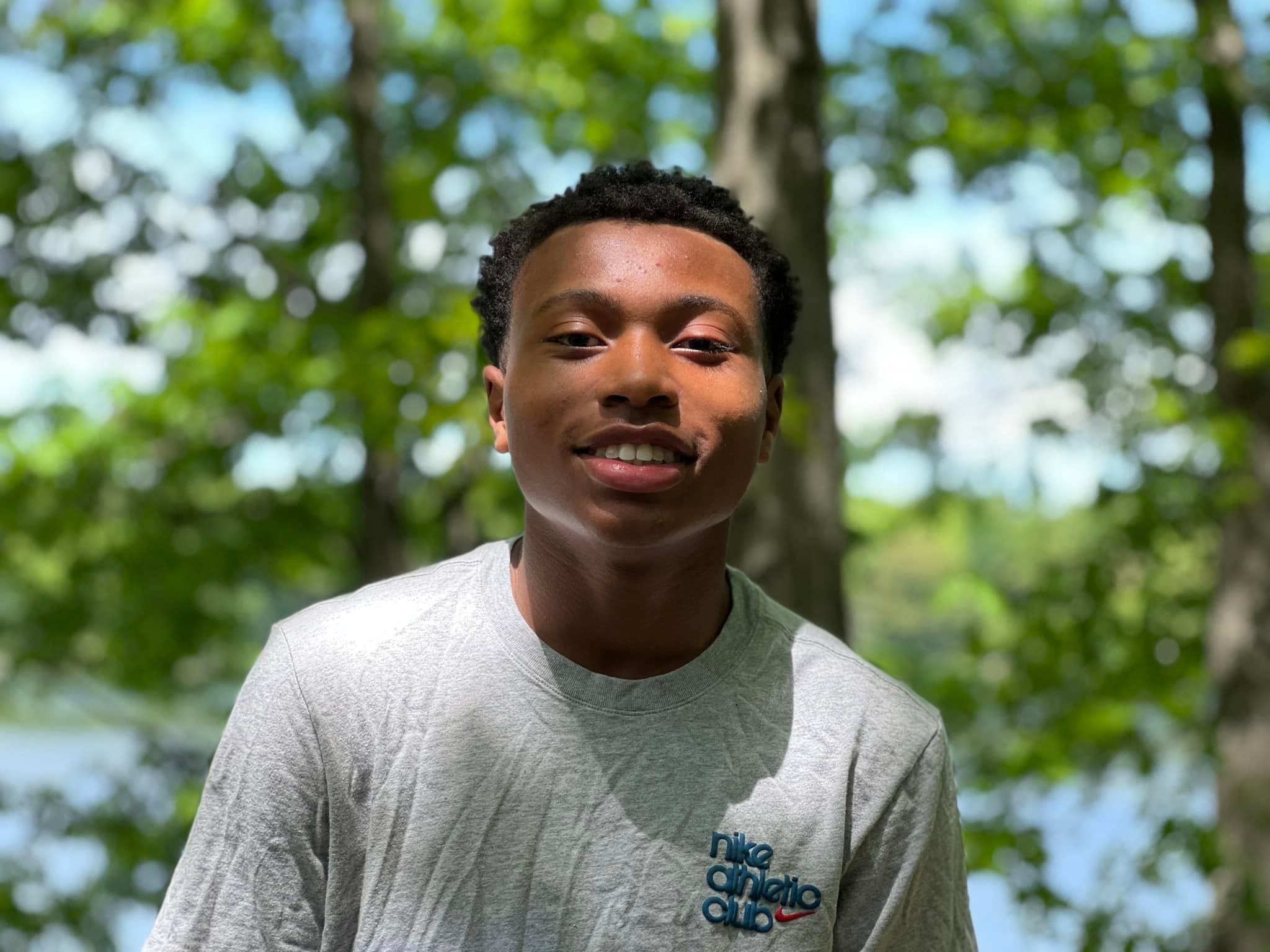
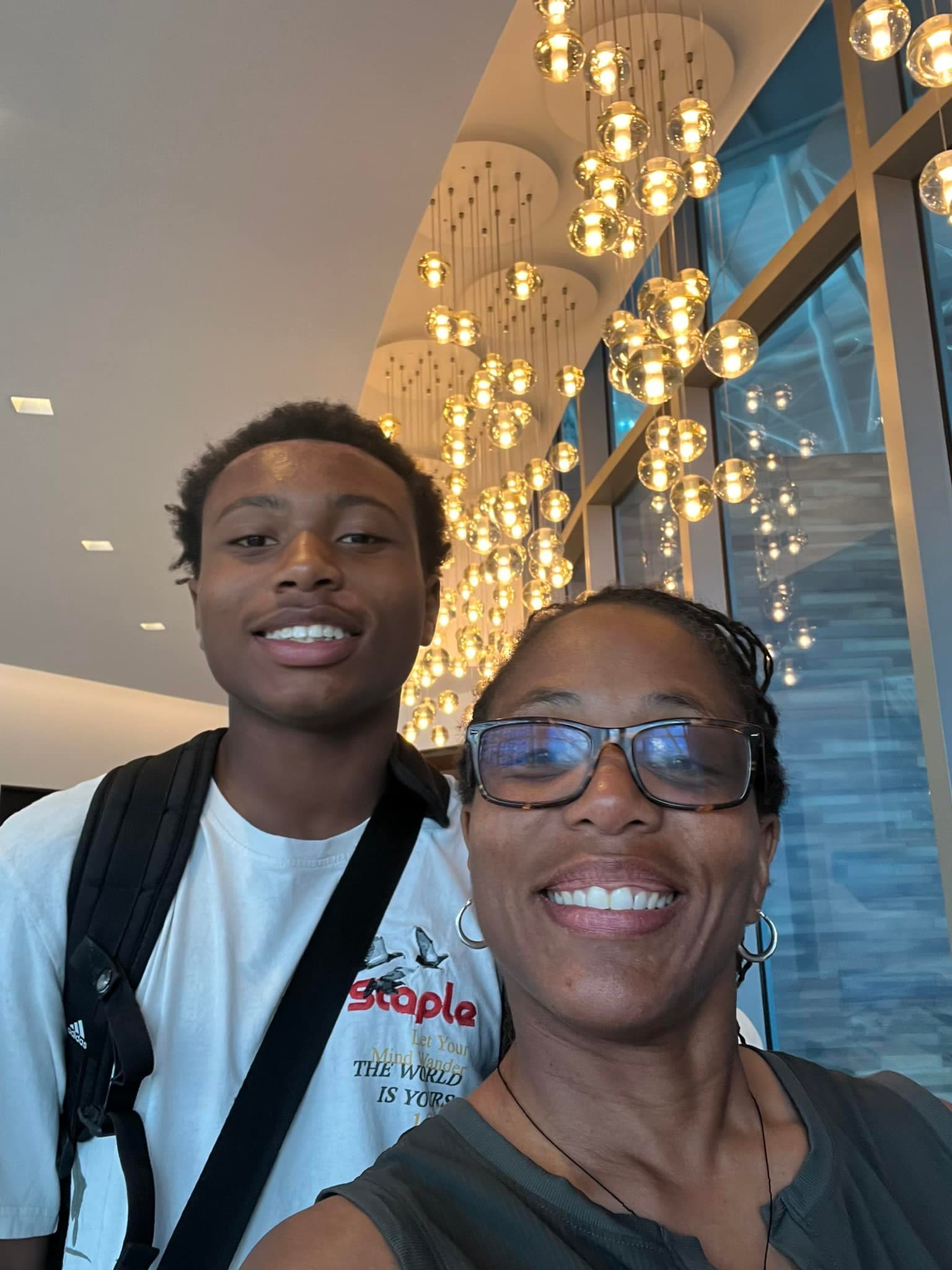
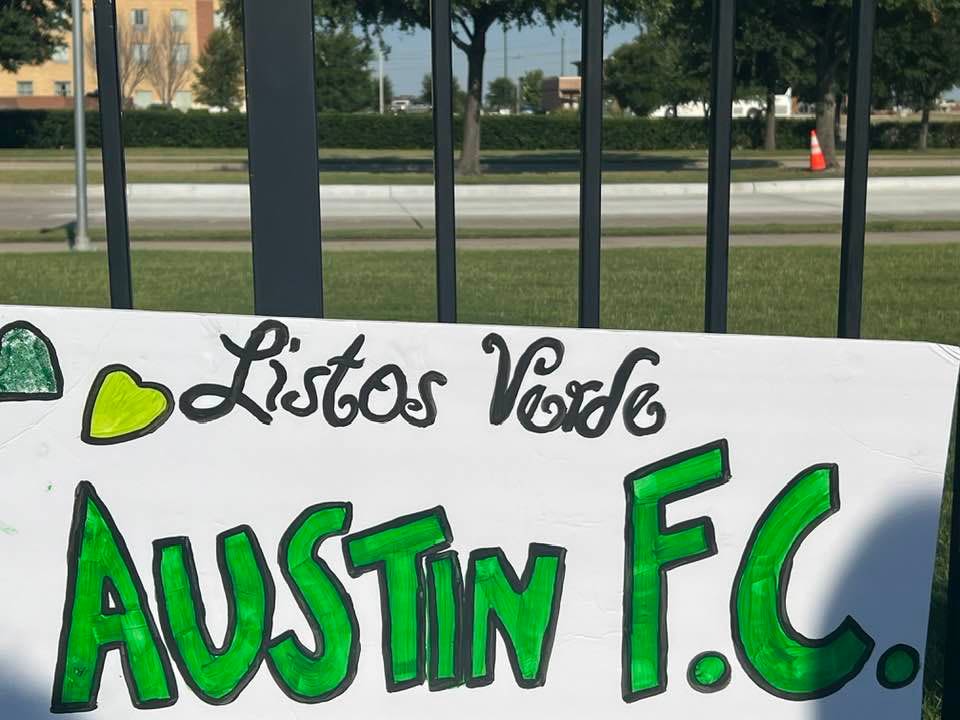
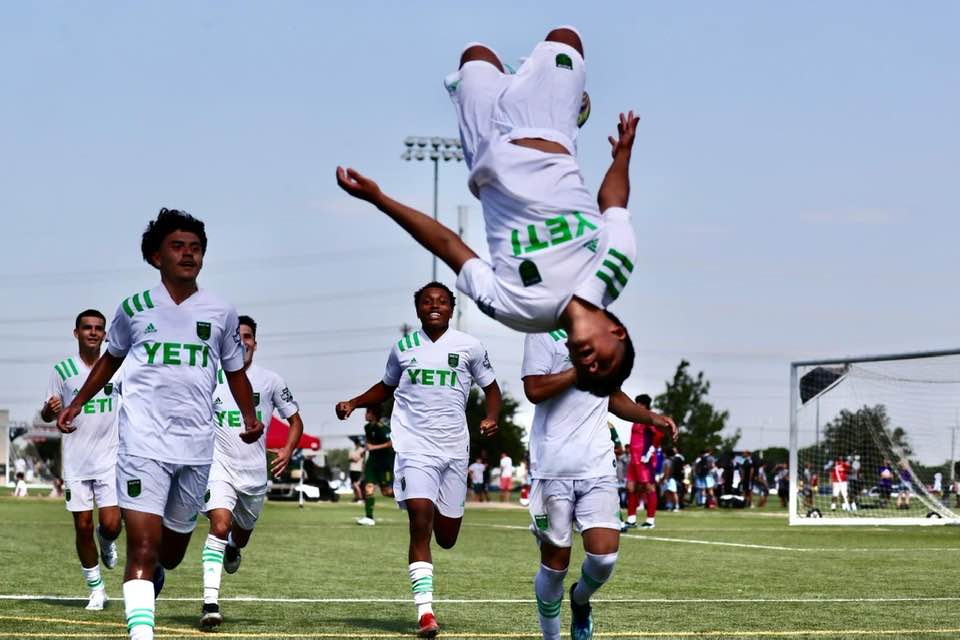
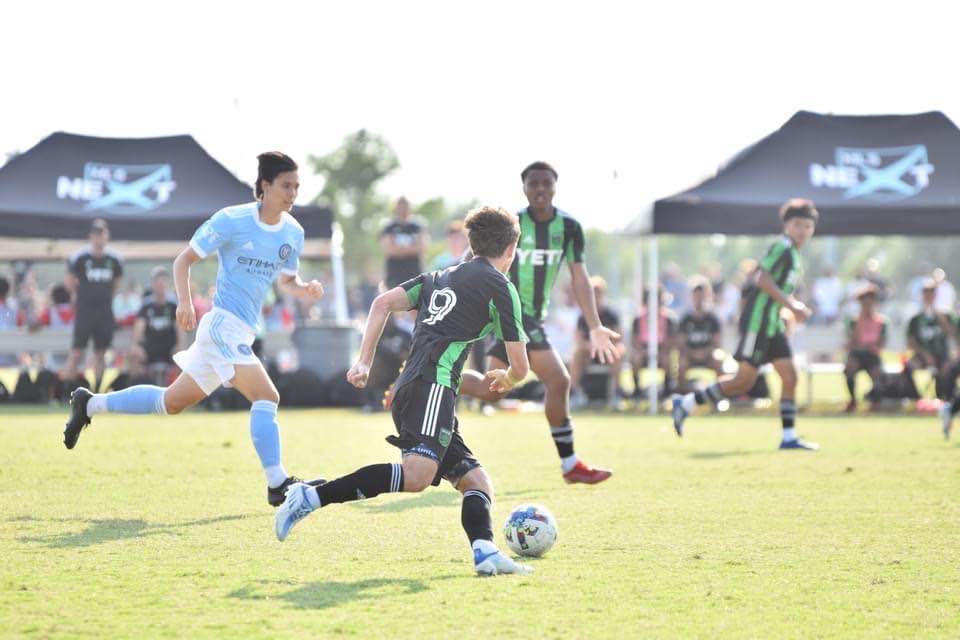
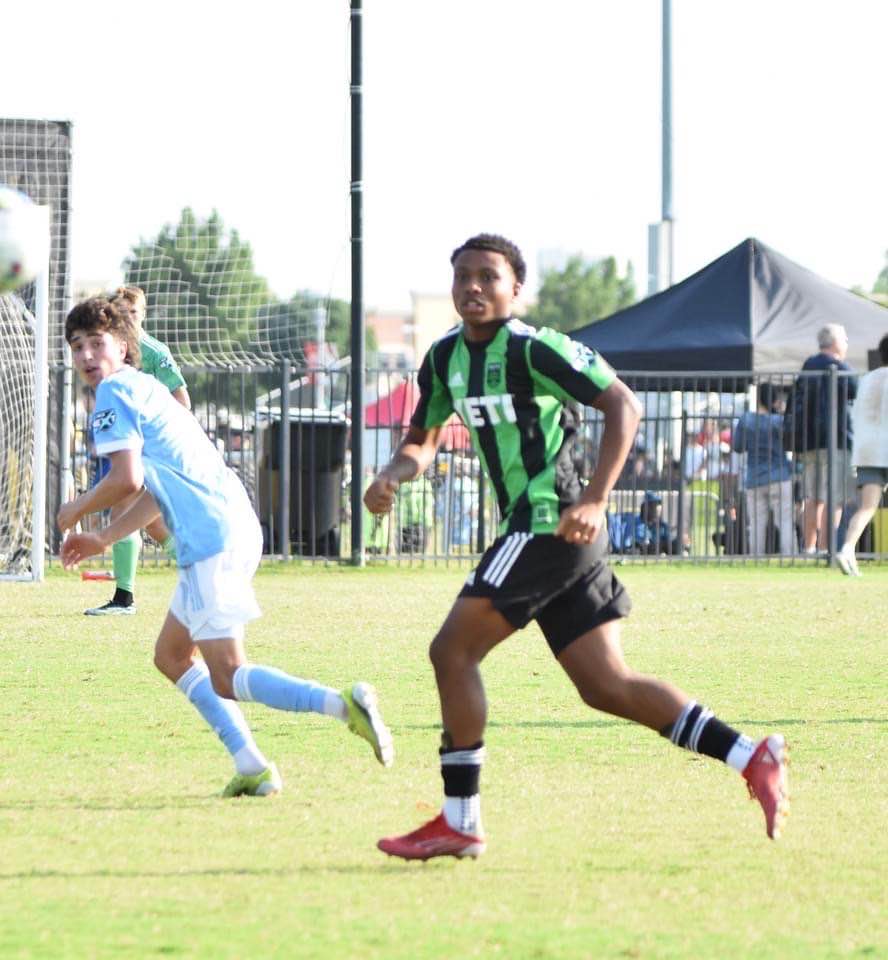
Sports Bridge
Find Your Child's Next Team
*This is an advertisement*

Sports Bridge is an online search platform that connects parents and youth sport coaches in a new streamlined way.
Finding the right team for your child is challenging and tedious. In fact, 22% of all children who stop playing sports is because of the coach of that team. Coaches are a huge part of any youth sports team. They are the one who is spending hours every single week with the children. This gets concerning when you look at the numbers of sexual assaults of sport coaches for youth teams.
2-8% of all athletes have been impacted by some form of sexual abuse and 93% who have been abused, don't even report it.
And yet there is still no way for parents to see information on the coach they are sending their child to. No way of even seeing what gender the coach is.
Until Now.
Sports Bridge not only helps parents find teams using smart filters, but it also allows them to see information on a coach. Crucial details like qualification type, age, photos, bios, and much more. This is an absolute first for this industry and is more important than ever to give parents control when it comes to finding a youth sports team for their child.
Sports Bridge works by searching with your zip code, you'll then see all the teams in your area, from there you can add filters to be shown teams that meet your unique criteria. Click a team to see more information and get detailed coach information of that team. Once you've found a team you like, you can reach out to the coach directly from Sports Bridge.
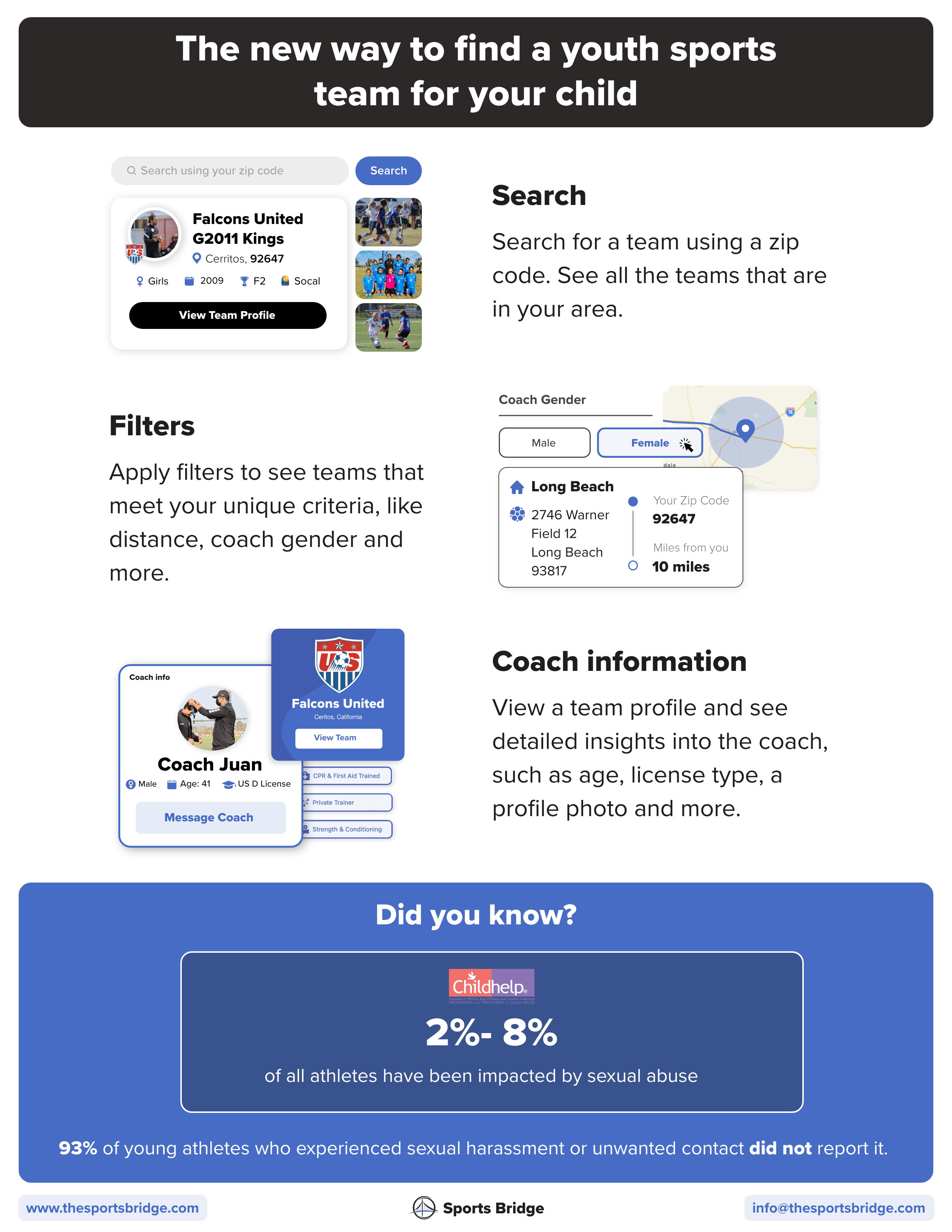

Most soccer coaches will agree that one of the most important aspects of player development is that the player be comfortable with the ball. One of the best ways for a player to become comfortable with the ball is “free play.” What is free play? It’s just kids and a soccer ball and their imagination. No rules and no adult supervision.
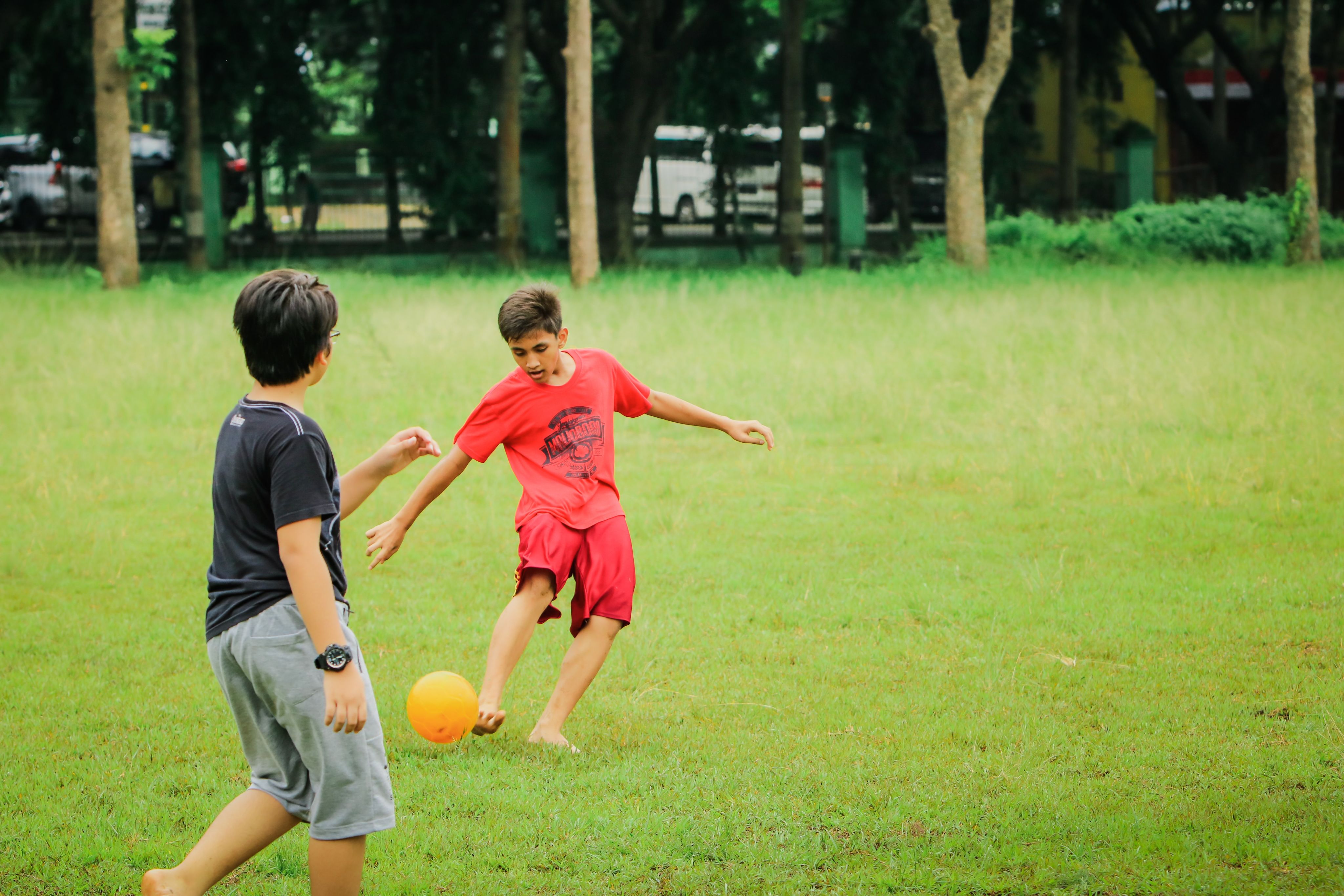
According to all the research I’ve done, unstructured play in general is a really effective way for kids to learn. According to Dr. Peter Gray, author of Free to Learn, writes in Psychology Today: “Our cultural obsession with schooling has led many to the misconception that the only activities that count in children's development are those that are led by adults. All lessons are seen implicitly as coming top-down, from capable adults to incapable children. What, after all, could my precious child learn from other children?”
On the other hand, he sees that children-led activities also play a critical role in childrens’ development. Children learn valuable skills and lessons from these “informal sports.”
Plenty has been written about how free play benefits soccer development.
The massive importance of free play
Kelley Pulisic – On the Importance of Free Play
You get the picture. Almost everyone agrees free play is beneficial for soccer development and mental and physical development as well.
Why is it not happening?
My thesis is that certain aspects of American culture actually stunt youth development.
1. Soccer Organizations make it difficult for free play.
2. Parents don’t see the value in “free play”
3. Kids don’t play outside on their own
Let’s address these individually.
1. Soccer Organizations Make Free Play Difficult
In no way am I disparaging soccer clubs. There are a lot of factors discouraging free play that are out of their control. Cost of field maintenance, liability insurance, possibility of vandalism, shortage of coaches/volunteers (free play does not mean the absence of adults, it just means no adults involved in play or coaching).
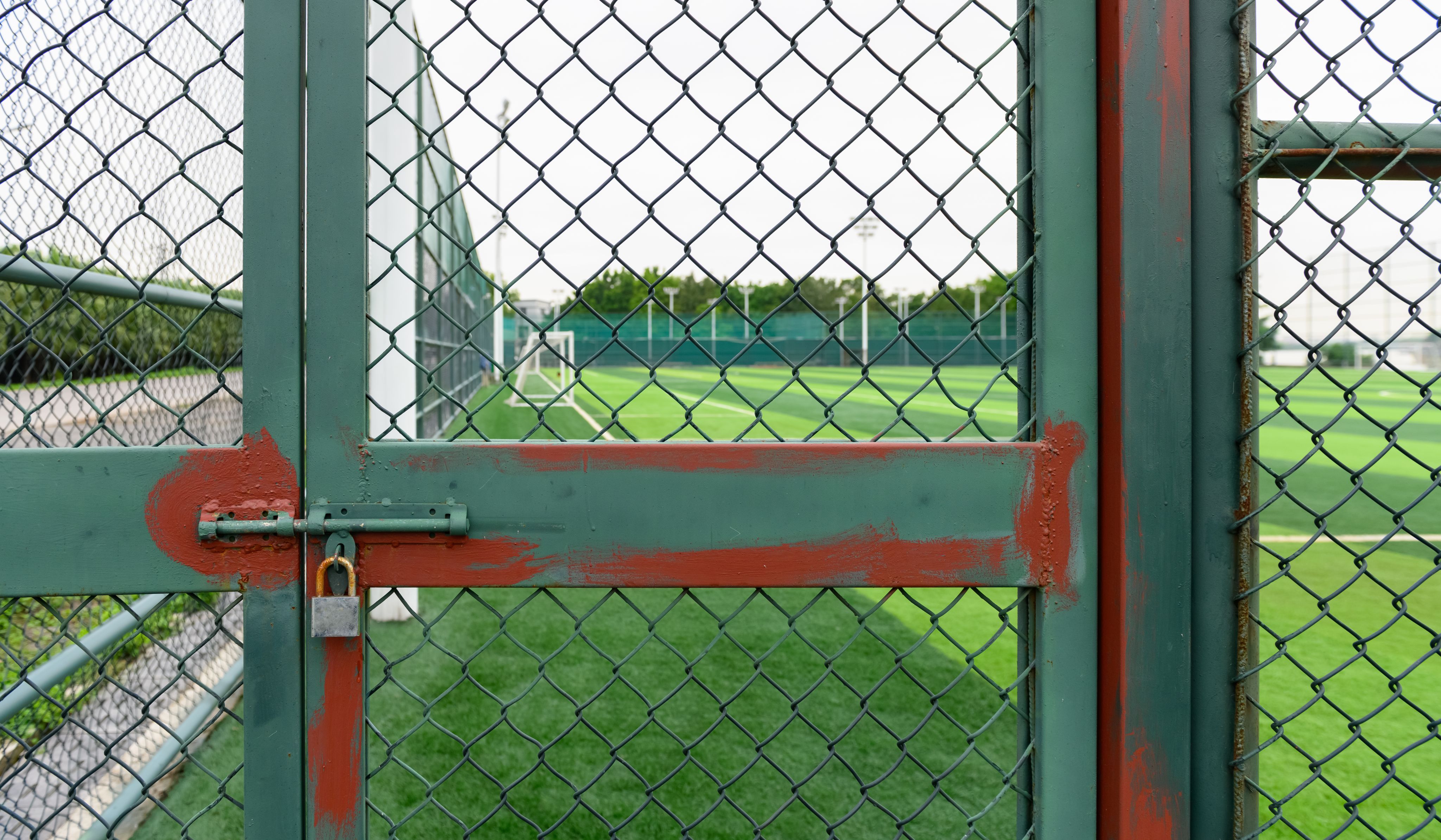
However, there are creative ways for clubs to encourage free play. How about 15 minutes at the start or end of every practice?
2. Parents don’t see the value in free play
Most of our kids would play soccer all day every day if they could. We haul them to practice 3/4 times a week. Then we sign them up for private training, futsal, 3v3 tournaments, indoor soccer, ODP, beach soccer, and any other organized soccer event we can find. As parents, we have goals for our kids, and want them to progress. Nothing wrong with that. However, kids respond better when the activity is simply fun. There should be room to let the kids play on their own, just for the fun of it. Our kids are overscheduled, and spend way almost as much time in the car as they do playing soccer.

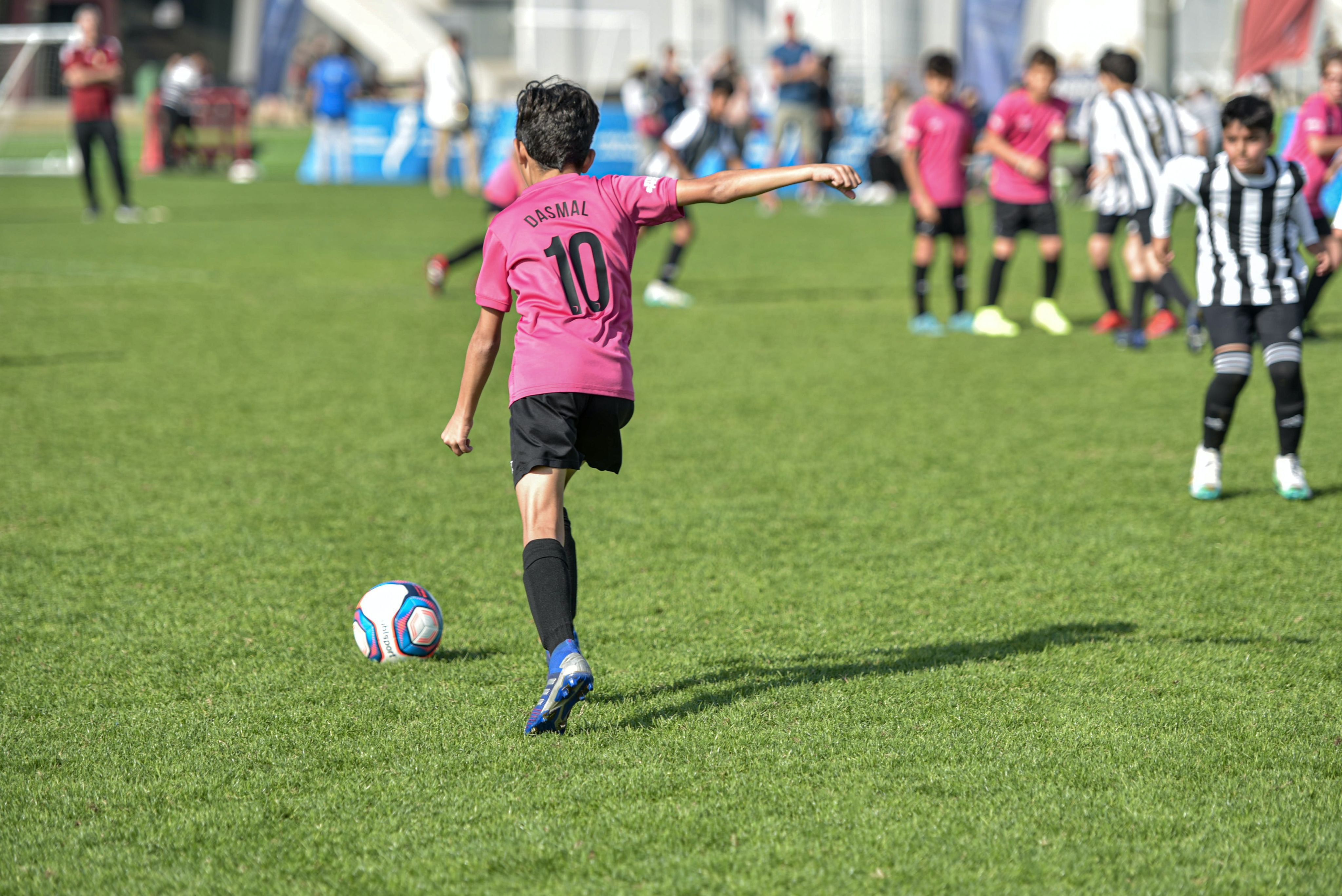
We have an outdoor full basketball court in our subdivision. I suggested that we have futsal games there. All we would have had to do was put 2 goals at each end. The parents looked at me like I was from outer space. “My kids play club soccer” “Who’s going to coach them?” “What if somebody gets hurt?” “We don’t have time” No one saw the value in kids just getting together to play. Quite disappointing
3. Kids Don’t Play Outside
Before cell phones, internet, streaming services, and social media, there was outside. On non school days,you got up, maybe watched a cartoon or two, did your chores, and then headed outside. Nothing planned or scheduled. You played kickball, football, dodgeball, or soccer, and even a few made up sports only known to you and your friends. You rode your bike for miles. Maybe you explored the woods. The point is, you participated in free play. The only rule was you better be in your own yard when the street lights came on at dusk.
Unfortunately, many kids don’t experience that. Some of the best soccer training your kid will get is with a soccer ball and his/her imagination.
What can be done?
If things are going to change, it has to start with us, the parents. There are some things we can do. We can start by possibly scheduling a little less organized soccer. Maybe let them go outside and kick the ball for an hour instead. Better yet, go out in the backyard and play some 1v1 with them. Make it fun. Invite the neighborhood kids over, set out a cooler of gatorade, and give them a soccer ball. Lock the back door to keep them outside, and watch the magic happen.
I realize this is not always feasible, and not every kid will go out and play soccer on their own.
We used to generate what I call “free play lite.” During winter break, my son always played on an indoor soccer team and a futsal team. However, it was never his regular club team. He always played with a mish mash team, and just for fun. Most of the teams were club teams that played together year round. They had their regular coaches, and treated them as regular games. My son’s teams just went out to have fun. Win, lose, or draw, they had a blast. No pressure, all fun.It wasn’t quite free play, but it was kids playing soccer simply because they love to play.
We can’t change this overnight, but we can start. Now get off your computer or phone, get your kid off their screen, hand them a soccer ball, and kick them outside! They’ll be a better soccer player!
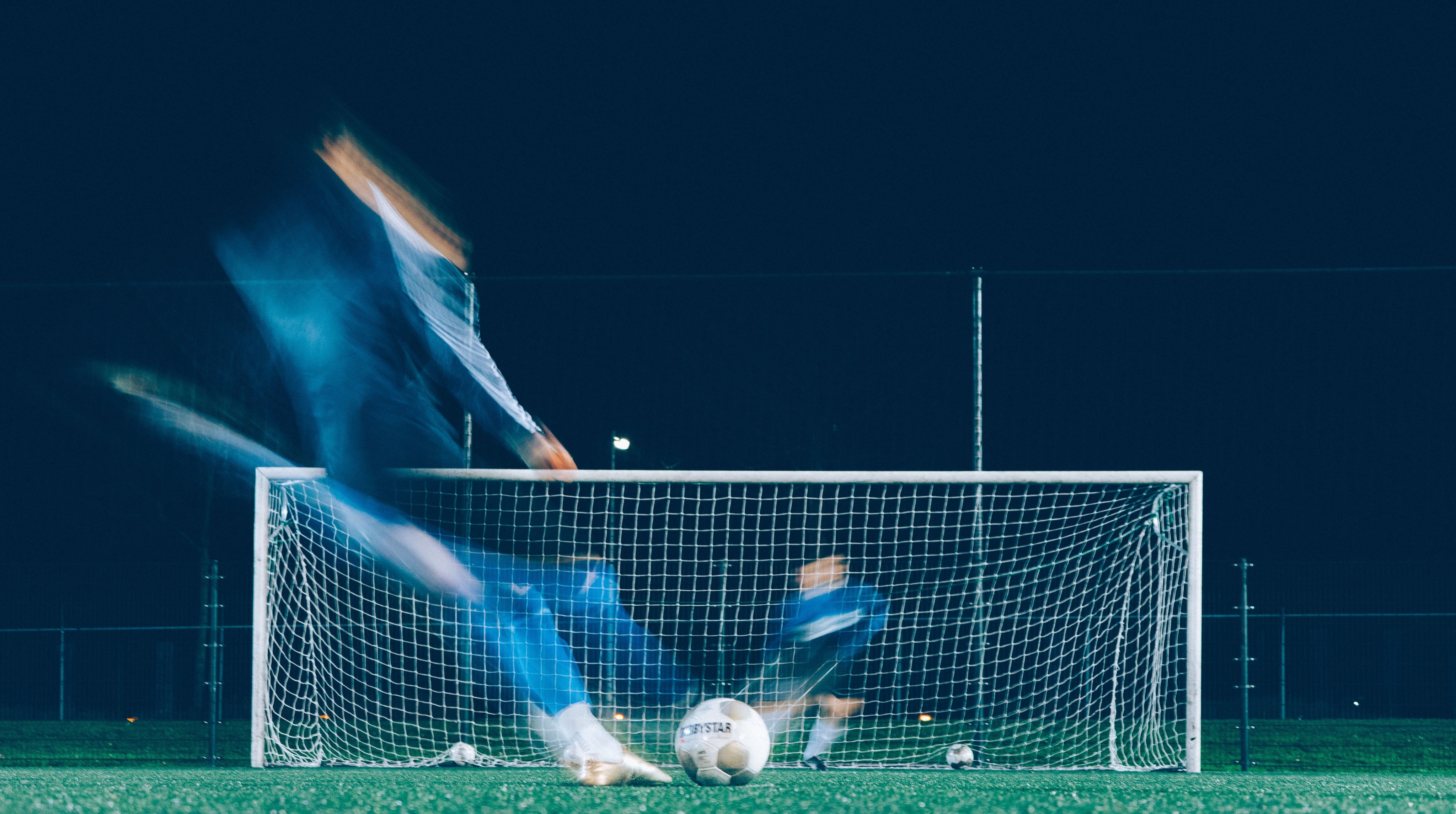
Meet A Contributor
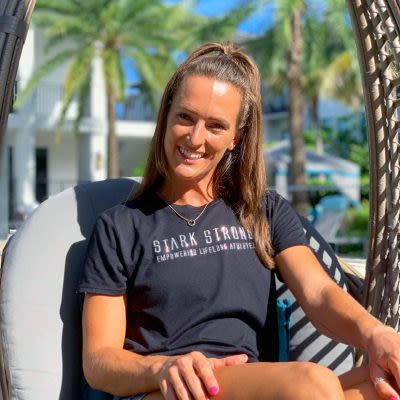
Laura Stark, Founder and Performance Specialist
Laura completed her college career as a 4 year Track and Field athlete and earned her B.S. in
Exercise Science from Truman State University in May of 2015. Taking the tools she learned
from her college career, internship, and various high level coaches in the NFL, MLB, NHL, and
Sports Performance fields she started Stark Strong Performance, LLC in August of 2016. While continuing to learn under her mentor at the NFL level and hone in on speed development and injury prevention with NFL Combine, she developed a program to take the tools only seen at the pro level and share them with middle and high school age athletes. The Speed Enhancement Mentorship was founded in October of 2020 to not only share these high level tools, but to also create a lifestyle change sustainable beyond our athletes time with us.
Specializing in Speed Development and Injury Prevention
Think you’re a good fit? This mentorship is designed specific to your needs and requires us to speak directly to understand best where you are at in your journey. No matter what we decide, we promise to provide some value during this call. Book your call here so we can take a deep dive into your needs:
https://starkstrongperformance.com/15-min-call/
Looking for something less intense but still want to get faster? Speed Impact is designed for those who are not quite ready for the 1 on 1 aspect and heavy workload. This gives you all the tools and resources we use with our 1 on 1 athletes but you have the ability to work at your own pace for simply a monthly fee of $99 with no commitment beyond the first month.
More can be found here:
https://starkstrongperformance.com/speed-impact/
